Carbon Emission Reduction: Management Responsibility and Stakeholder Theory
VerifiedAdded on 2023/06/03
|21
|4957
|461
AI Summary
This paper investigates the relationship between management responsibility and stakeholder theory in reducing carbon emissions. The study uses ANOVA to test the hypothesis that higher influence of Board Responsibility for climate change in an organization leads to higher carbon emission reduction. The paper also includes a literature review, conceptual model, data collection, and descriptive and inferential analysis.
Contribute Materials
Your contribution can guide someone’s learning journey. Share your
documents today.
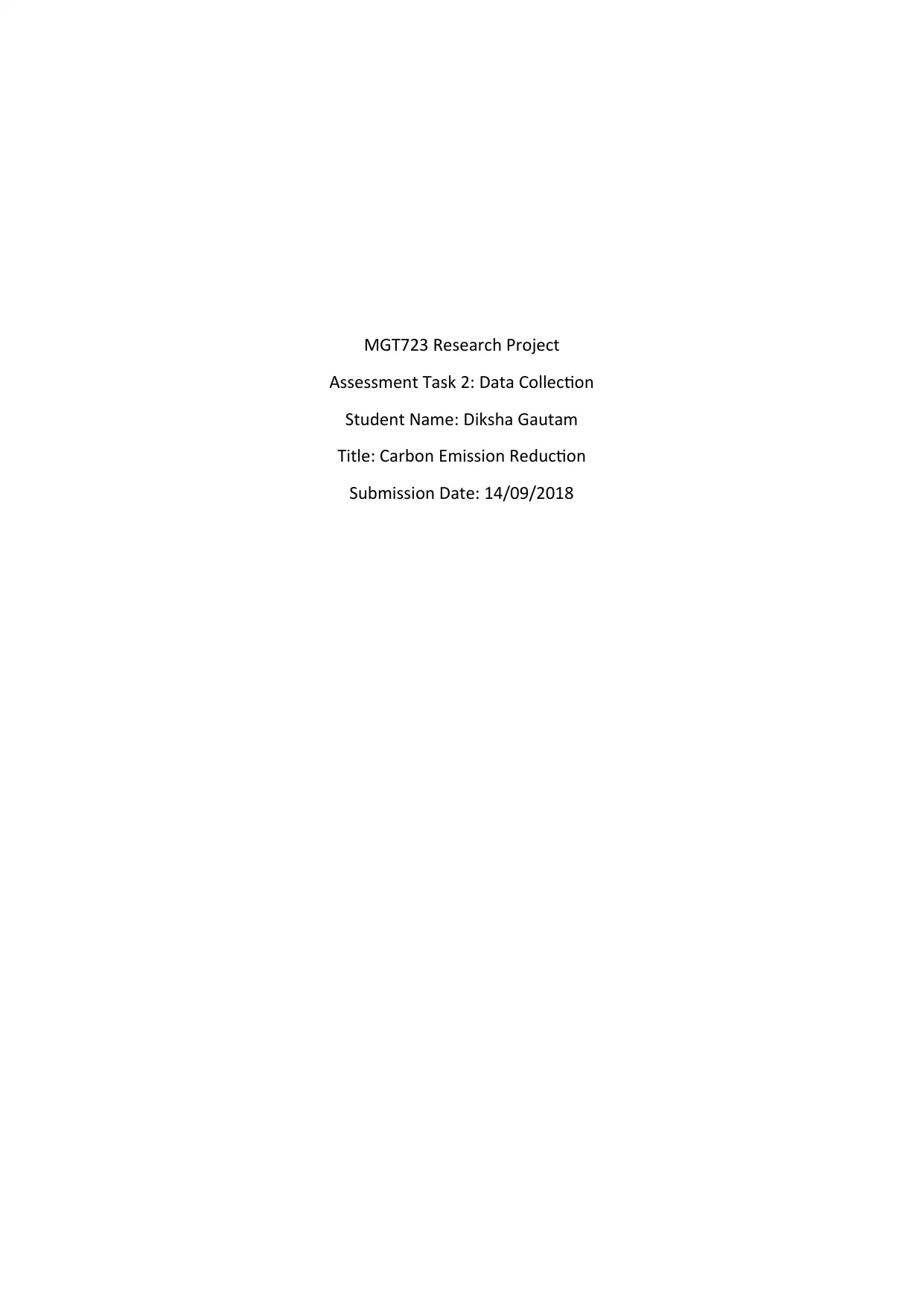
MGT723 Research Project
Assessment Task 2: Data Collection
Student Name: Diksha Gautam
Title: Carbon Emission Reduction
Submission Date: 14/09/2018
Assessment Task 2: Data Collection
Student Name: Diksha Gautam
Title: Carbon Emission Reduction
Submission Date: 14/09/2018
Secure Best Marks with AI Grader
Need help grading? Try our AI Grader for instant feedback on your assignments.
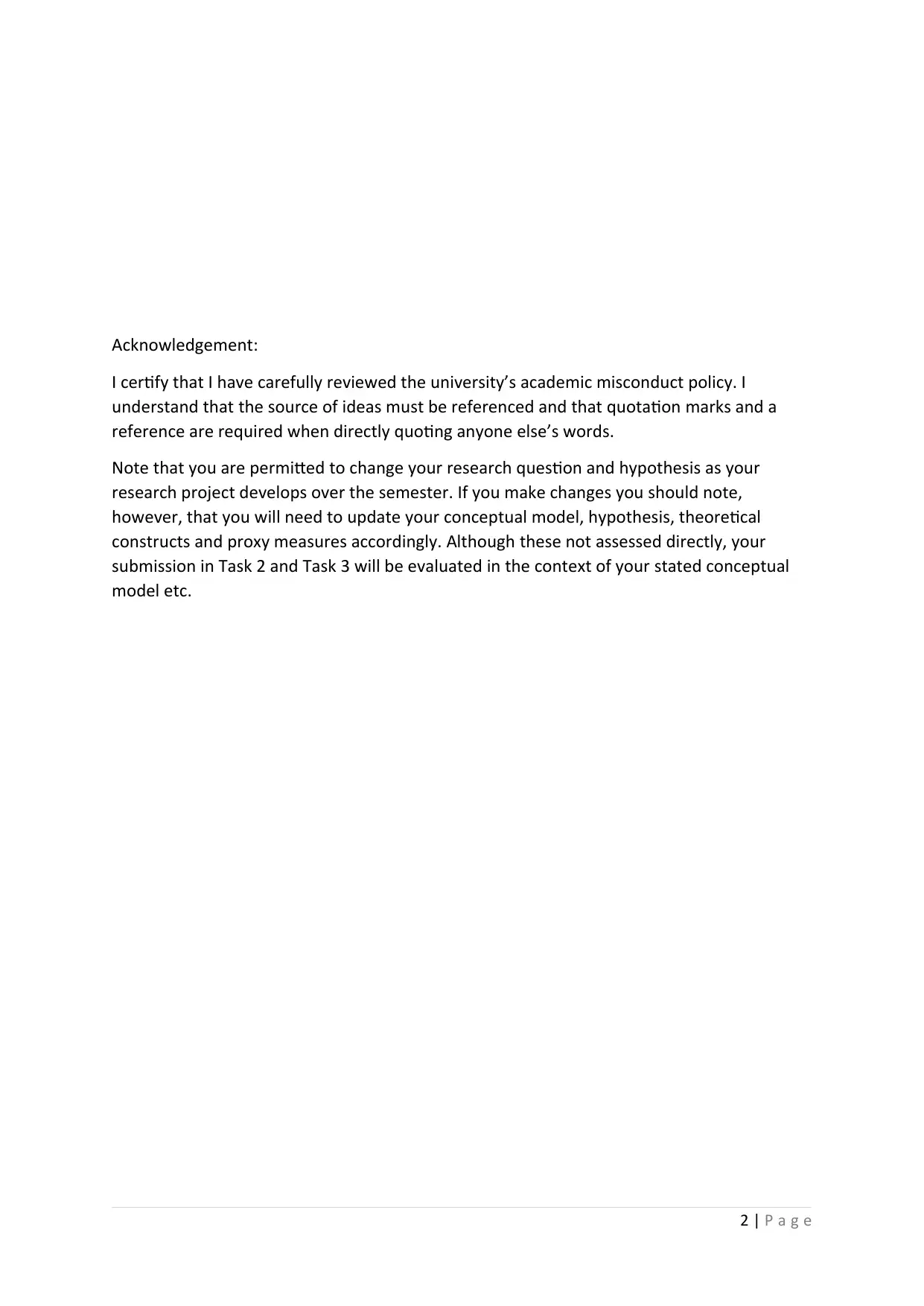
Acknowledgement:
I certify that I have carefully reviewed the university’s academic misconduct policy. I
understand that the source of ideas must be referenced and that quotation marks and a
reference are required when directly quoting anyone else’s words.
Note that you are permitted to change your research question and hypothesis as your
research project develops over the semester. If you make changes you should note,
however, that you will need to update your conceptual model, hypothesis, theoretical
constructs and proxy measures accordingly. Although these not assessed directly, your
submission in Task 2 and Task 3 will be evaluated in the context of your stated conceptual
model etc.
2 | P a g e
I certify that I have carefully reviewed the university’s academic misconduct policy. I
understand that the source of ideas must be referenced and that quotation marks and a
reference are required when directly quoting anyone else’s words.
Note that you are permitted to change your research question and hypothesis as your
research project develops over the semester. If you make changes you should note,
however, that you will need to update your conceptual model, hypothesis, theoretical
constructs and proxy measures accordingly. Although these not assessed directly, your
submission in Task 2 and Task 3 will be evaluated in the context of your stated conceptual
model etc.
2 | P a g e
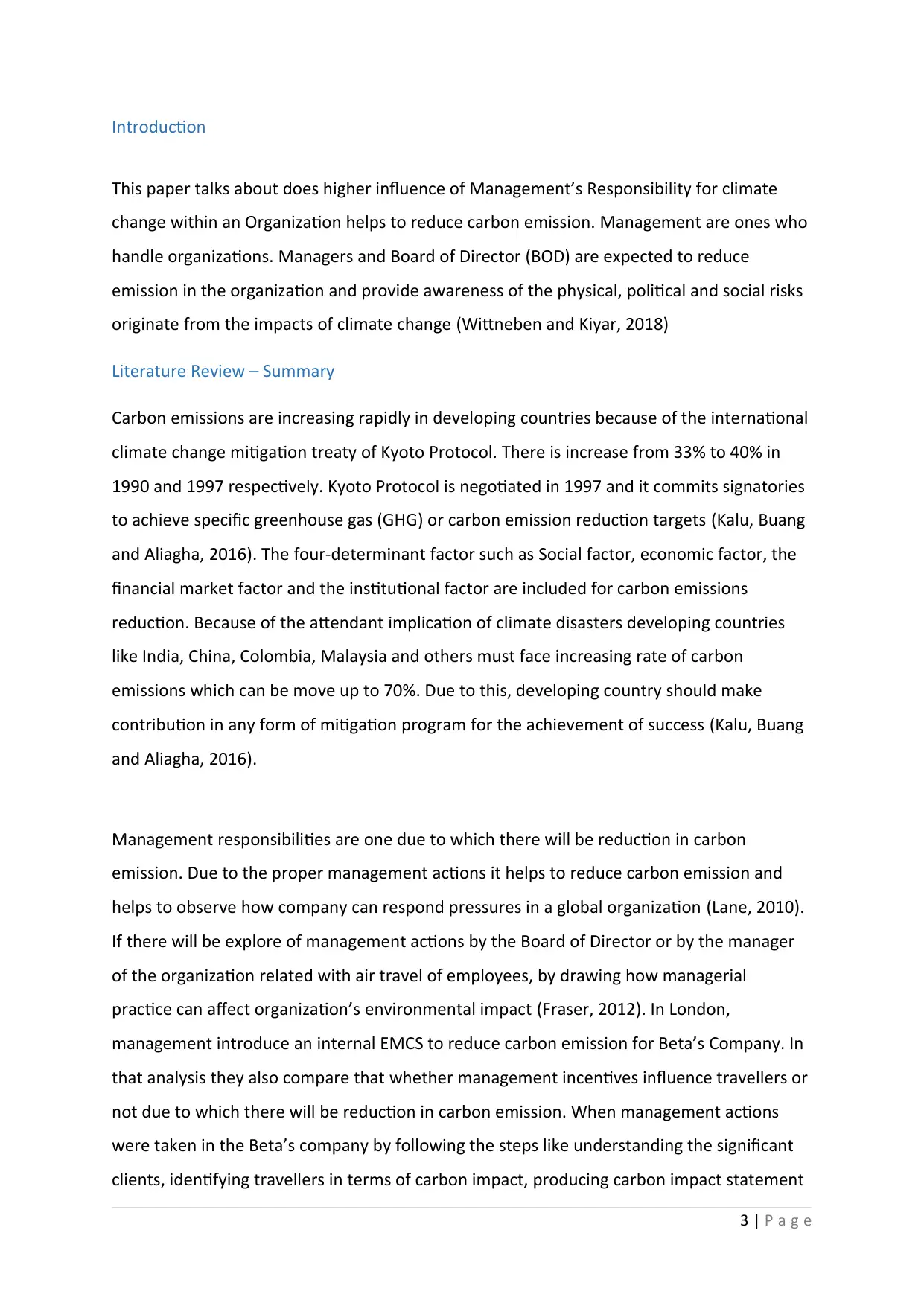
Introduction
This paper talks about does higher influence of Management’s Responsibility for climate
change within an Organization helps to reduce carbon emission. Management are ones who
handle organizations. Managers and Board of Director (BOD) are expected to reduce
emission in the organization and provide awareness of the physical, political and social risks
originate from the impacts of climate change (Wittneben and Kiyar, 2018)
Literature Review – Summary
Carbon emissions are increasing rapidly in developing countries because of the international
climate change mitigation treaty of Kyoto Protocol. There is increase from 33% to 40% in
1990 and 1997 respectively. Kyoto Protocol is negotiated in 1997 and it commits signatories
to achieve specific greenhouse gas (GHG) or carbon emission reduction targets (Kalu, Buang
and Aliagha, 2016). The four-determinant factor such as Social factor, economic factor, the
financial market factor and the institutional factor are included for carbon emissions
reduction. Because of the attendant implication of climate disasters developing countries
like India, China, Colombia, Malaysia and others must face increasing rate of carbon
emissions which can be move up to 70%. Due to this, developing country should make
contribution in any form of mitigation program for the achievement of success (Kalu, Buang
and Aliagha, 2016).
Management responsibilities are one due to which there will be reduction in carbon
emission. Due to the proper management actions it helps to reduce carbon emission and
helps to observe how company can respond pressures in a global organization (Lane, 2010).
If there will be explore of management actions by the Board of Director or by the manager
of the organization related with air travel of employees, by drawing how managerial
practice can affect organization’s environmental impact (Fraser, 2012). In London,
management introduce an internal EMCS to reduce carbon emission for Beta’s Company. In
that analysis they also compare that whether management incentives influence travellers or
not due to which there will be reduction in carbon emission. When management actions
were taken in the Beta’s company by following the steps like understanding the significant
clients, identifying travellers in terms of carbon impact, producing carbon impact statement
3 | P a g e
This paper talks about does higher influence of Management’s Responsibility for climate
change within an Organization helps to reduce carbon emission. Management are ones who
handle organizations. Managers and Board of Director (BOD) are expected to reduce
emission in the organization and provide awareness of the physical, political and social risks
originate from the impacts of climate change (Wittneben and Kiyar, 2018)
Literature Review – Summary
Carbon emissions are increasing rapidly in developing countries because of the international
climate change mitigation treaty of Kyoto Protocol. There is increase from 33% to 40% in
1990 and 1997 respectively. Kyoto Protocol is negotiated in 1997 and it commits signatories
to achieve specific greenhouse gas (GHG) or carbon emission reduction targets (Kalu, Buang
and Aliagha, 2016). The four-determinant factor such as Social factor, economic factor, the
financial market factor and the institutional factor are included for carbon emissions
reduction. Because of the attendant implication of climate disasters developing countries
like India, China, Colombia, Malaysia and others must face increasing rate of carbon
emissions which can be move up to 70%. Due to this, developing country should make
contribution in any form of mitigation program for the achievement of success (Kalu, Buang
and Aliagha, 2016).
Management responsibilities are one due to which there will be reduction in carbon
emission. Due to the proper management actions it helps to reduce carbon emission and
helps to observe how company can respond pressures in a global organization (Lane, 2010).
If there will be explore of management actions by the Board of Director or by the manager
of the organization related with air travel of employees, by drawing how managerial
practice can affect organization’s environmental impact (Fraser, 2012). In London,
management introduce an internal EMCS to reduce carbon emission for Beta’s Company. In
that analysis they also compare that whether management incentives influence travellers or
not due to which there will be reduction in carbon emission. When management actions
were taken in the Beta’s company by following the steps like understanding the significant
clients, identifying travellers in terms of carbon impact, producing carbon impact statement
3 | P a g e
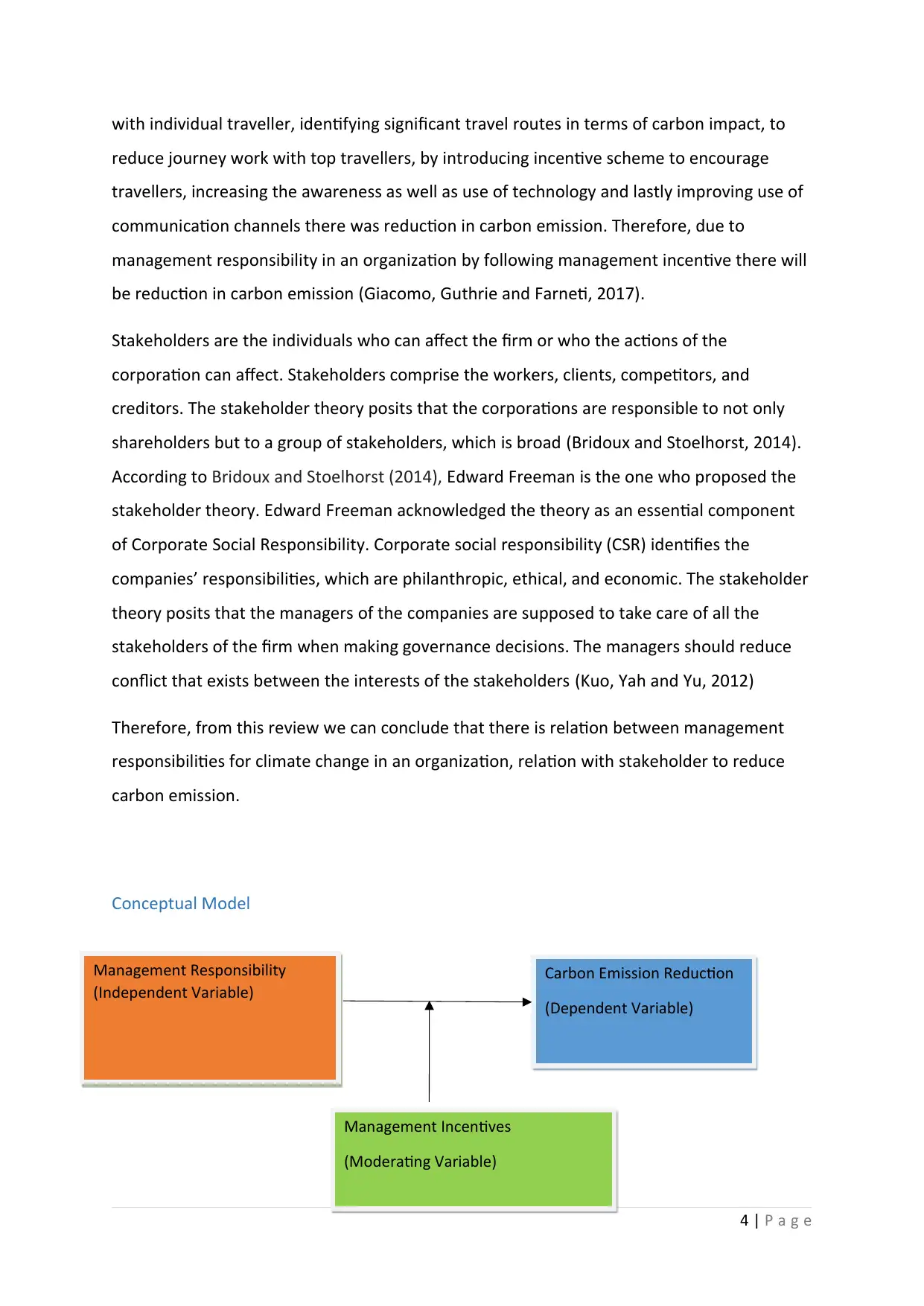
with individual traveller, identifying significant travel routes in terms of carbon impact, to
reduce journey work with top travellers, by introducing incentive scheme to encourage
travellers, increasing the awareness as well as use of technology and lastly improving use of
communication channels there was reduction in carbon emission. Therefore, due to
management responsibility in an organization by following management incentive there will
be reduction in carbon emission (Giacomo, Guthrie and Farneti, 2017).
Stakeholders are the individuals who can affect the firm or who the actions of the
corporation can affect. Stakeholders comprise the workers, clients, competitors, and
creditors. The stakeholder theory posits that the corporations are responsible to not only
shareholders but to a group of stakeholders, which is broad (Bridoux and Stoelhorst, 2014).
According to Bridoux and Stoelhorst (2014), Edward Freeman is the one who proposed the
stakeholder theory. Edward Freeman acknowledged the theory as an essential component
of Corporate Social Responsibility. Corporate social responsibility (CSR) identifies the
companies’ responsibilities, which are philanthropic, ethical, and economic. The stakeholder
theory posits that the managers of the companies are supposed to take care of all the
stakeholders of the firm when making governance decisions. The managers should reduce
conflict that exists between the interests of the stakeholders (Kuo, Yah and Yu, 2012)
Therefore, from this review we can conclude that there is relation between management
responsibilities for climate change in an organization, relation with stakeholder to reduce
carbon emission.
Conceptual Model
4 | P a g e
Management Responsibility
(Independent Variable)
Carbon Emission Reduction
(Dependent Variable)
Management Incentives
(Moderating Variable)
reduce journey work with top travellers, by introducing incentive scheme to encourage
travellers, increasing the awareness as well as use of technology and lastly improving use of
communication channels there was reduction in carbon emission. Therefore, due to
management responsibility in an organization by following management incentive there will
be reduction in carbon emission (Giacomo, Guthrie and Farneti, 2017).
Stakeholders are the individuals who can affect the firm or who the actions of the
corporation can affect. Stakeholders comprise the workers, clients, competitors, and
creditors. The stakeholder theory posits that the corporations are responsible to not only
shareholders but to a group of stakeholders, which is broad (Bridoux and Stoelhorst, 2014).
According to Bridoux and Stoelhorst (2014), Edward Freeman is the one who proposed the
stakeholder theory. Edward Freeman acknowledged the theory as an essential component
of Corporate Social Responsibility. Corporate social responsibility (CSR) identifies the
companies’ responsibilities, which are philanthropic, ethical, and economic. The stakeholder
theory posits that the managers of the companies are supposed to take care of all the
stakeholders of the firm when making governance decisions. The managers should reduce
conflict that exists between the interests of the stakeholders (Kuo, Yah and Yu, 2012)
Therefore, from this review we can conclude that there is relation between management
responsibilities for climate change in an organization, relation with stakeholder to reduce
carbon emission.
Conceptual Model
4 | P a g e
Management Responsibility
(Independent Variable)
Carbon Emission Reduction
(Dependent Variable)
Management Incentives
(Moderating Variable)
Secure Best Marks with AI Grader
Need help grading? Try our AI Grader for instant feedback on your assignments.
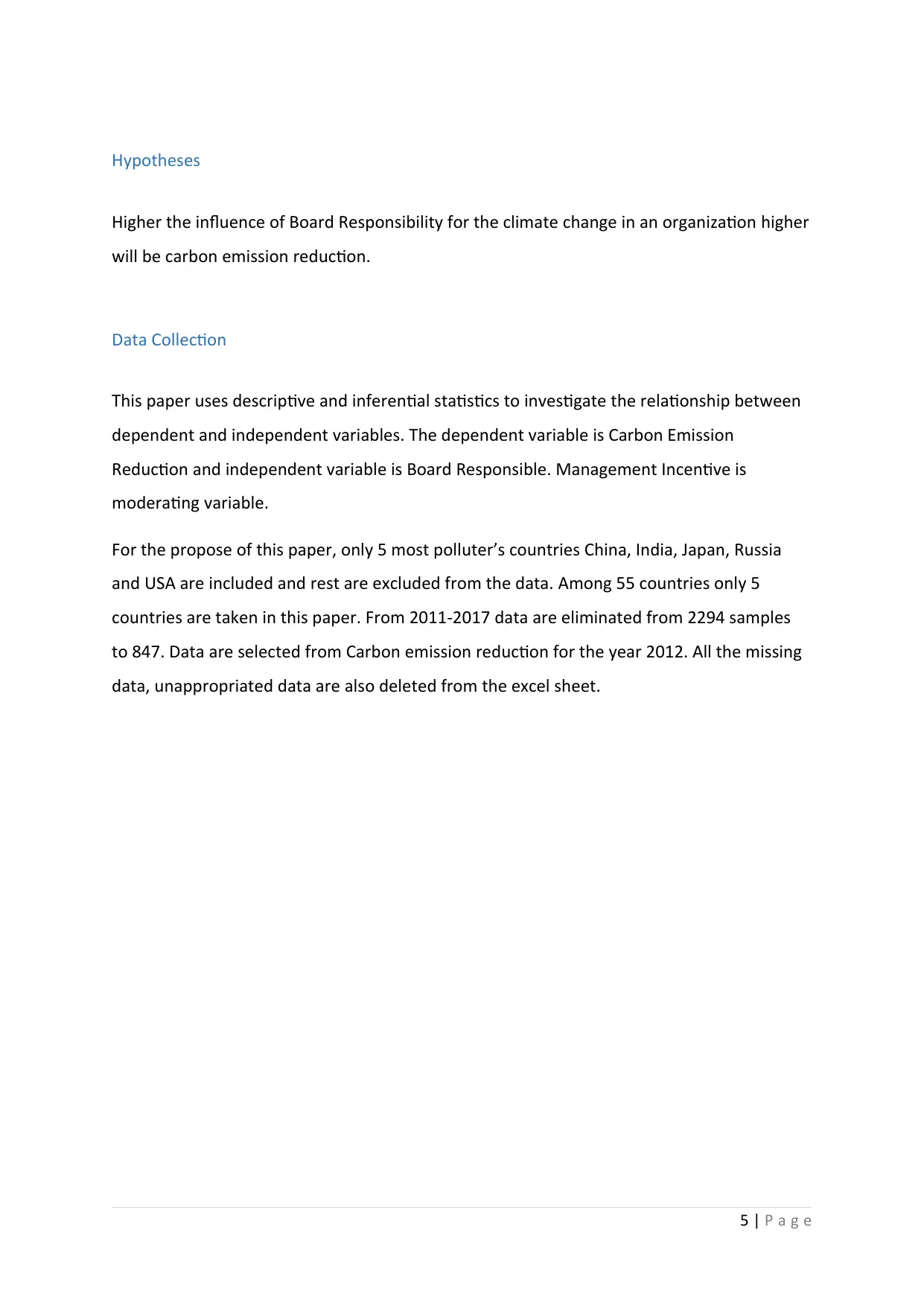
Hypotheses
Higher the influence of Board Responsibility for the climate change in an organization higher
will be carbon emission reduction.
Data Collection
This paper uses descriptive and inferential statistics to investigate the relationship between
dependent and independent variables. The dependent variable is Carbon Emission
Reduction and independent variable is Board Responsible. Management Incentive is
moderating variable.
For the propose of this paper, only 5 most polluter’s countries China, India, Japan, Russia
and USA are included and rest are excluded from the data. Among 55 countries only 5
countries are taken in this paper. From 2011-2017 data are eliminated from 2294 samples
to 847. Data are selected from Carbon emission reduction for the year 2012. All the missing
data, unappropriated data are also deleted from the excel sheet.
5 | P a g e
Higher the influence of Board Responsibility for the climate change in an organization higher
will be carbon emission reduction.
Data Collection
This paper uses descriptive and inferential statistics to investigate the relationship between
dependent and independent variables. The dependent variable is Carbon Emission
Reduction and independent variable is Board Responsible. Management Incentive is
moderating variable.
For the propose of this paper, only 5 most polluter’s countries China, India, Japan, Russia
and USA are included and rest are excluded from the data. Among 55 countries only 5
countries are taken in this paper. From 2011-2017 data are eliminated from 2294 samples
to 847. Data are selected from Carbon emission reduction for the year 2012. All the missing
data, unappropriated data are also deleted from the excel sheet.
5 | P a g e
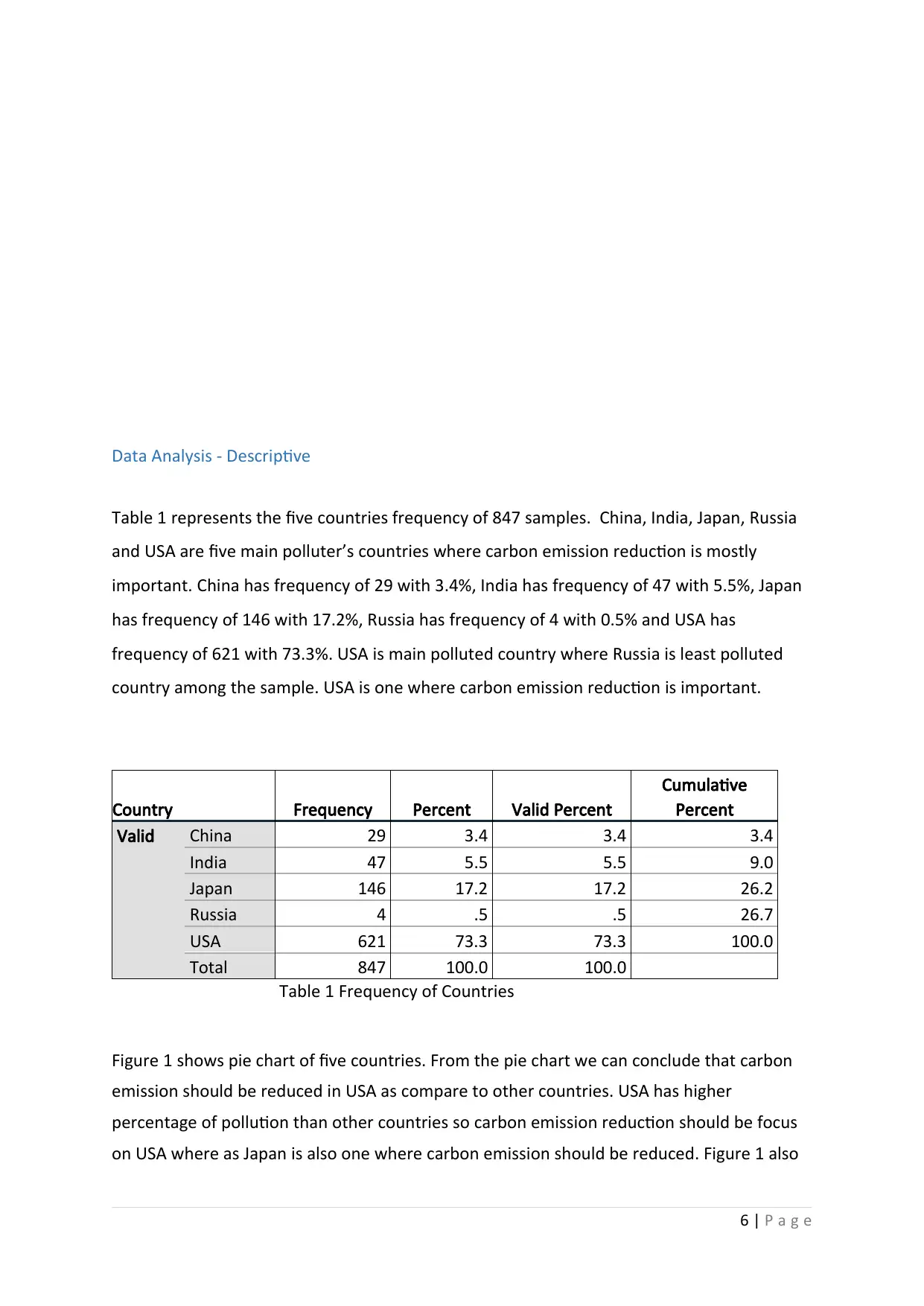
Data Analysis - Descriptive
Table 1 represents the five countries frequency of 847 samples. China, India, Japan, Russia
and USA are five main polluter’s countries where carbon emission reduction is mostly
important. China has frequency of 29 with 3.4%, India has frequency of 47 with 5.5%, Japan
has frequency of 146 with 17.2%, Russia has frequency of 4 with 0.5% and USA has
frequency of 621 with 73.3%. USA is main polluted country where Russia is least polluted
country among the sample. USA is one where carbon emission reduction is important.
Country Frequency Percent Valid Percent
Cumulative
Percent
Valid China 29 3.4 3.4 3.4
India 47 5.5 5.5 9.0
Japan 146 17.2 17.2 26.2
Russia 4 .5 .5 26.7
USA 621 73.3 73.3 100.0
Total 847 100.0 100.0
Table 1 Frequency of Countries
Figure 1 shows pie chart of five countries. From the pie chart we can conclude that carbon
emission should be reduced in USA as compare to other countries. USA has higher
percentage of pollution than other countries so carbon emission reduction should be focus
on USA where as Japan is also one where carbon emission should be reduced. Figure 1 also
6 | P a g e
Table 1 represents the five countries frequency of 847 samples. China, India, Japan, Russia
and USA are five main polluter’s countries where carbon emission reduction is mostly
important. China has frequency of 29 with 3.4%, India has frequency of 47 with 5.5%, Japan
has frequency of 146 with 17.2%, Russia has frequency of 4 with 0.5% and USA has
frequency of 621 with 73.3%. USA is main polluted country where Russia is least polluted
country among the sample. USA is one where carbon emission reduction is important.
Country Frequency Percent Valid Percent
Cumulative
Percent
Valid China 29 3.4 3.4 3.4
India 47 5.5 5.5 9.0
Japan 146 17.2 17.2 26.2
Russia 4 .5 .5 26.7
USA 621 73.3 73.3 100.0
Total 847 100.0 100.0
Table 1 Frequency of Countries
Figure 1 shows pie chart of five countries. From the pie chart we can conclude that carbon
emission should be reduced in USA as compare to other countries. USA has higher
percentage of pollution than other countries so carbon emission reduction should be focus
on USA where as Japan is also one where carbon emission should be reduced. Figure 1 also
6 | P a g e
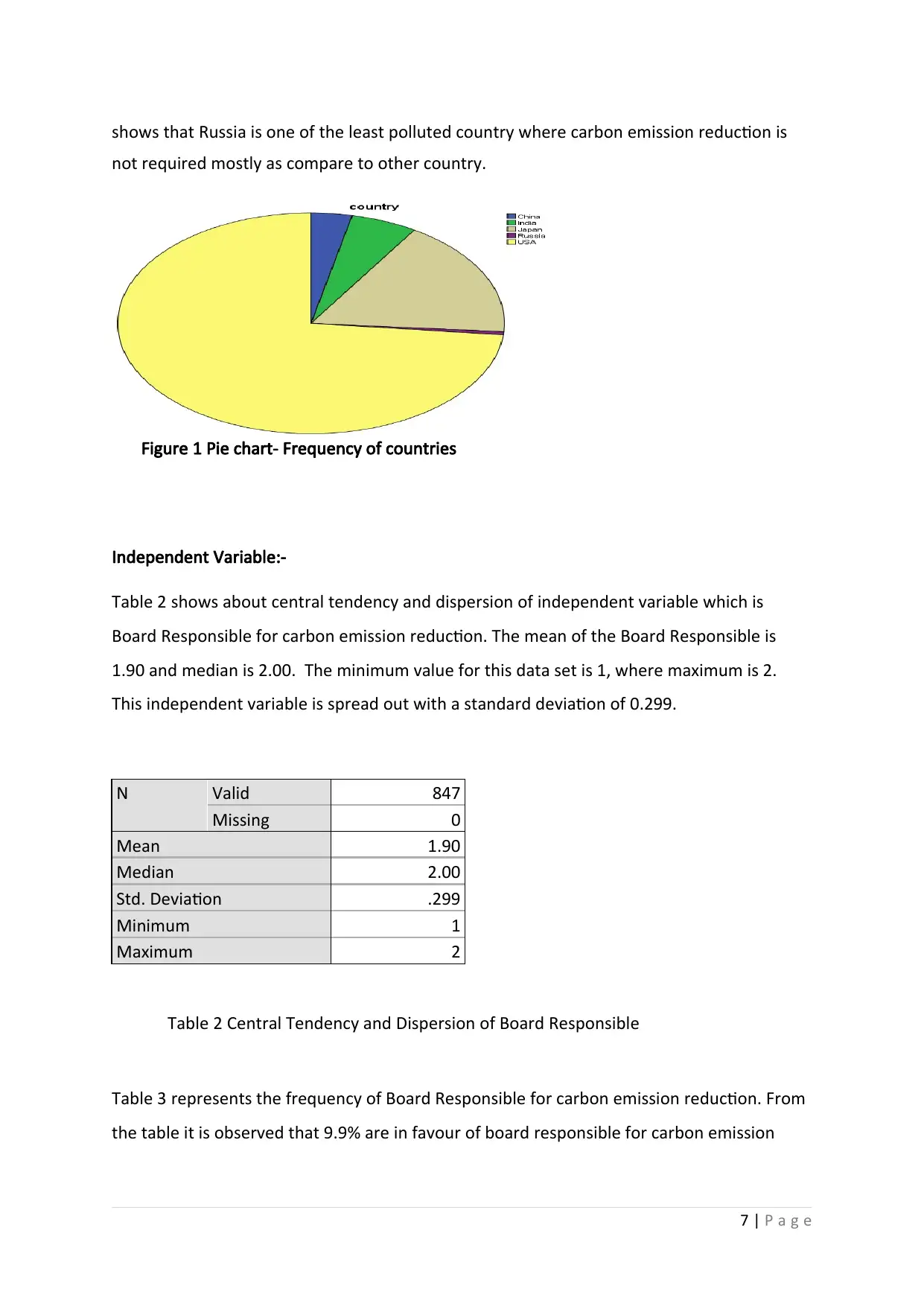
shows that Russia is one of the least polluted country where carbon emission reduction is
not required mostly as compare to other country.
Figure 1 Pie chart- Frequency of countries
Independent Variable:-
Table 2 shows about central tendency and dispersion of independent variable which is
Board Responsible for carbon emission reduction. The mean of the Board Responsible is
1.90 and median is 2.00. The minimum value for this data set is 1, where maximum is 2.
This independent variable is spread out with a standard deviation of 0.299.
Table 2 Central Tendency and Dispersion of Board Responsible
Table 3 represents the frequency of Board Responsible for carbon emission reduction. From
the table it is observed that 9.9% are in favour of board responsible for carbon emission
7 | P a g e
N Valid 847
Missing 0
Mean 1.90
Median 2.00
Std. Deviation .299
Minimum 1
Maximum 2
not required mostly as compare to other country.
Figure 1 Pie chart- Frequency of countries
Independent Variable:-
Table 2 shows about central tendency and dispersion of independent variable which is
Board Responsible for carbon emission reduction. The mean of the Board Responsible is
1.90 and median is 2.00. The minimum value for this data set is 1, where maximum is 2.
This independent variable is spread out with a standard deviation of 0.299.
Table 2 Central Tendency and Dispersion of Board Responsible
Table 3 represents the frequency of Board Responsible for carbon emission reduction. From
the table it is observed that 9.9% are in favour of board responsible for carbon emission
7 | P a g e
N Valid 847
Missing 0
Mean 1.90
Median 2.00
Std. Deviation .299
Minimum 1
Maximum 2
Paraphrase This Document
Need a fresh take? Get an instant paraphrase of this document with our AI Paraphraser
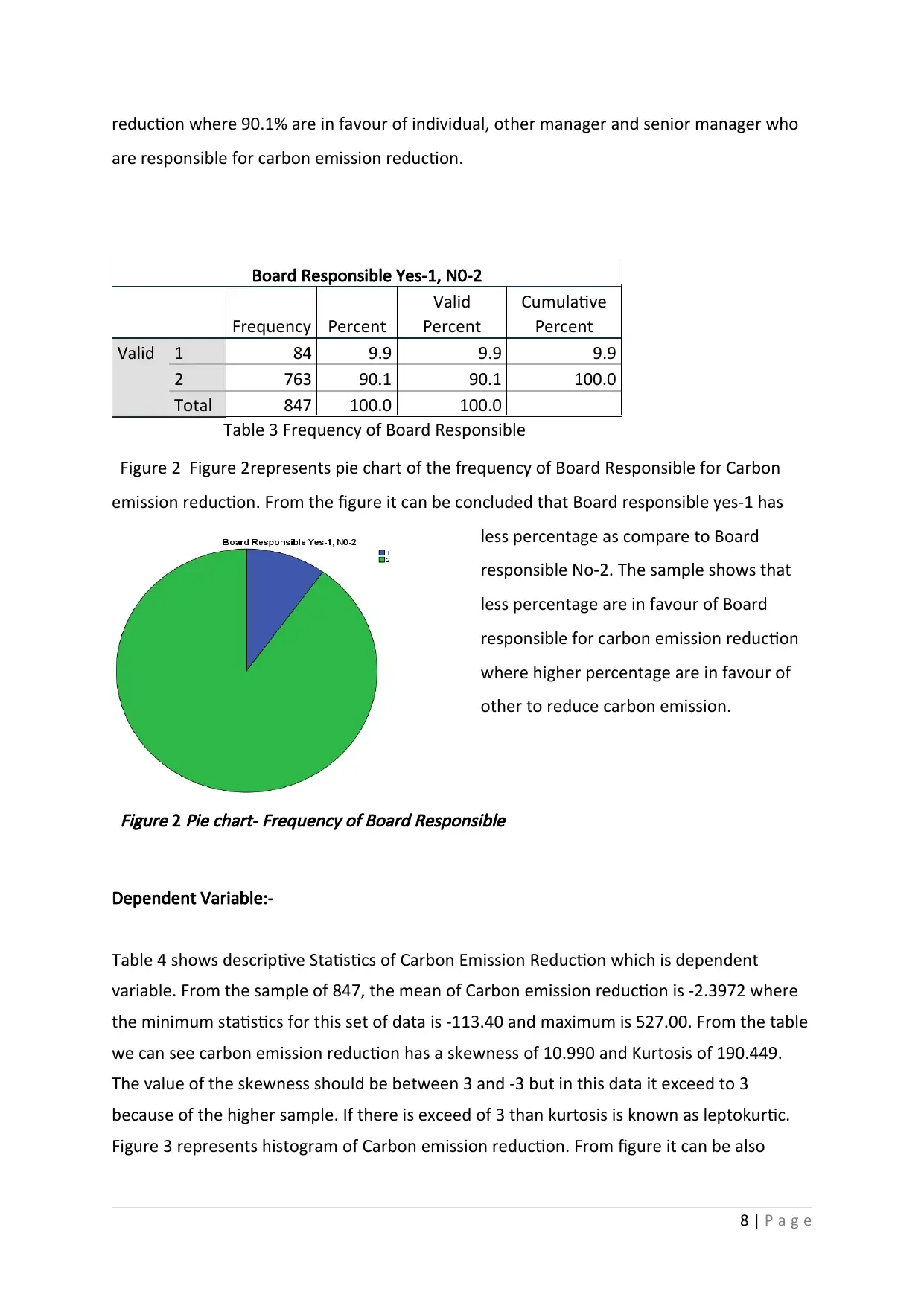
reduction where 90.1% are in favour of individual, other manager and senior manager who
are responsible for carbon emission reduction.
Board Responsible Yes-1, N0-2
Frequency Percent
Valid
Percent
Cumulative
Percent
Valid 1 84 9.9 9.9 9.9
2 763 90.1 90.1 100.0
Total 847 100.0 100.0
Table 3 Frequency of Board Responsible
Figure 2 Figure 2represents pie chart of the frequency of Board Responsible for Carbon
emission reduction. From the figure it can be concluded that Board responsible yes-1 has
less percentage as compare to Board
responsible No-2. The sample shows that
less percentage are in favour of Board
responsible for carbon emission reduction
where higher percentage are in favour of
other to reduce carbon emission.
Figure 2
Pie chart- Frequency of Board Responsible
Dependent Variable:-
Table 4 shows descriptive Statistics of Carbon Emission Reduction which is dependent
variable. From the sample of 847, the mean of Carbon emission reduction is -2.3972 where
the minimum statistics for this set of data is -113.40 and maximum is 527.00. From the table
we can see carbon emission reduction has a skewness of 10.990 and Kurtosis of 190.449.
The value of the skewness should be between 3 and -3 but in this data it exceed to 3
because of the higher sample. If there is exceed of 3 than kurtosis is known as leptokurtic.
Figure 3 represents histogram of Carbon emission reduction. From figure it can be also
8 | P a g e
are responsible for carbon emission reduction.
Board Responsible Yes-1, N0-2
Frequency Percent
Valid
Percent
Cumulative
Percent
Valid 1 84 9.9 9.9 9.9
2 763 90.1 90.1 100.0
Total 847 100.0 100.0
Table 3 Frequency of Board Responsible
Figure 2 Figure 2represents pie chart of the frequency of Board Responsible for Carbon
emission reduction. From the figure it can be concluded that Board responsible yes-1 has
less percentage as compare to Board
responsible No-2. The sample shows that
less percentage are in favour of Board
responsible for carbon emission reduction
where higher percentage are in favour of
other to reduce carbon emission.
Figure 2
Pie chart- Frequency of Board Responsible
Dependent Variable:-
Table 4 shows descriptive Statistics of Carbon Emission Reduction which is dependent
variable. From the sample of 847, the mean of Carbon emission reduction is -2.3972 where
the minimum statistics for this set of data is -113.40 and maximum is 527.00. From the table
we can see carbon emission reduction has a skewness of 10.990 and Kurtosis of 190.449.
The value of the skewness should be between 3 and -3 but in this data it exceed to 3
because of the higher sample. If there is exceed of 3 than kurtosis is known as leptokurtic.
Figure 3 represents histogram of Carbon emission reduction. From figure it can be also
8 | P a g e
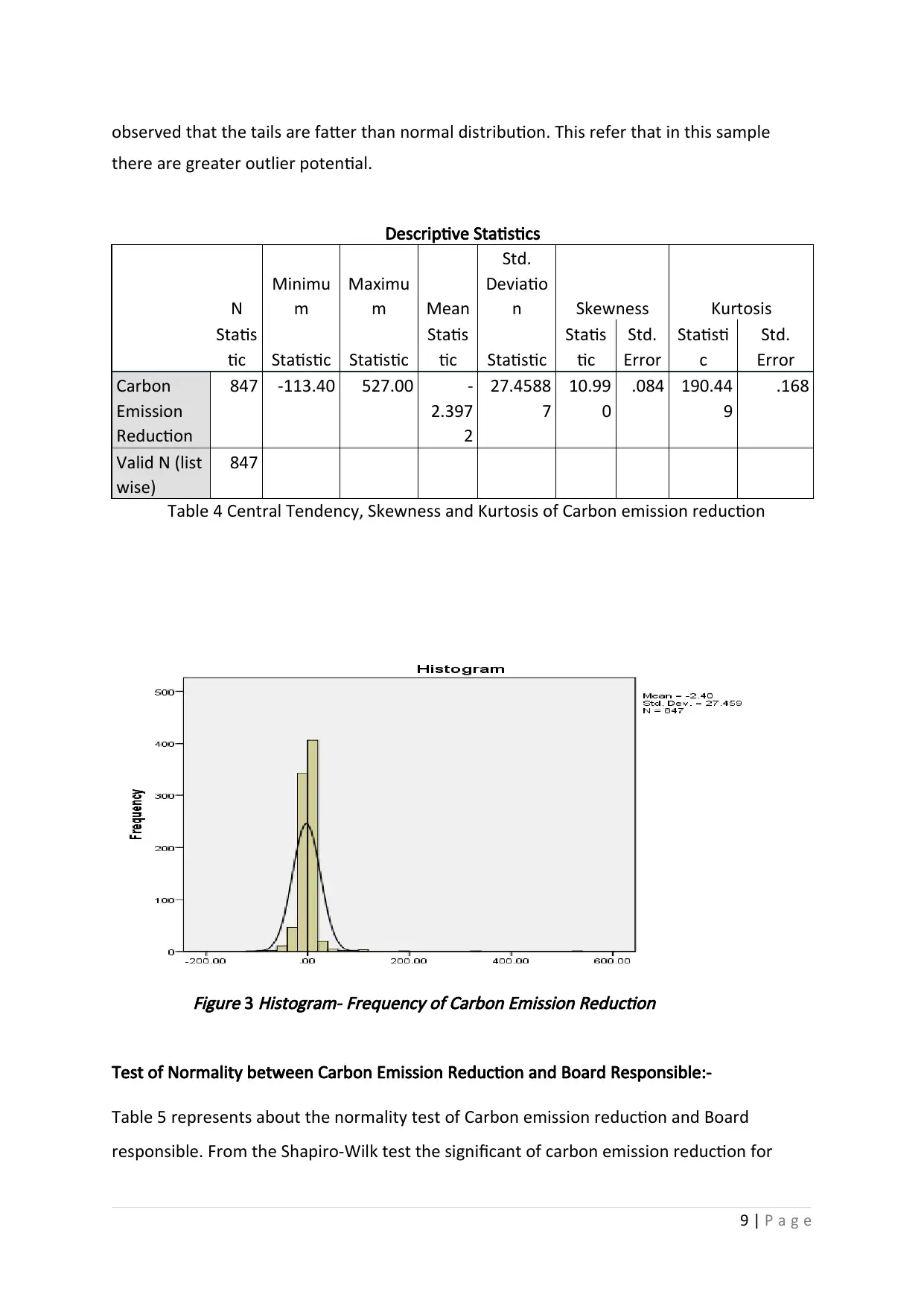
observed that the tails are fatter than normal distribution. This refer that in this sample
there are greater outlier potential.
Descriptive Statistics
N
Minimu
m
Maximu
m Mean
Std.
Deviatio
n Skewness Kurtosis
Statis
tic Statistic Statistic
Statis
tic Statistic
Statis
tic
Std.
Error
Statisti
c
Std.
Error
Carbon
Emission
Reduction
847 -113.40 527.00 -
2.397
2
27.4588
7
10.99
0
.084 190.44
9
.168
Valid N (list
wise)
847
Table 4 Central Tendency, Skewness and Kurtosis of Carbon emission reduction
Figure 3
Histogram- Frequency of Carbon Emission Reduction
Test of Normality between Carbon Emission Reduction and Board Responsible:-
Table 5 represents about the normality test of Carbon emission reduction and Board
responsible. From the Shapiro-Wilk test the significant of carbon emission reduction for
9 | P a g e
there are greater outlier potential.
Descriptive Statistics
N
Minimu
m
Maximu
m Mean
Std.
Deviatio
n Skewness Kurtosis
Statis
tic Statistic Statistic
Statis
tic Statistic
Statis
tic
Std.
Error
Statisti
c
Std.
Error
Carbon
Emission
Reduction
847 -113.40 527.00 -
2.397
2
27.4588
7
10.99
0
.084 190.44
9
.168
Valid N (list
wise)
847
Table 4 Central Tendency, Skewness and Kurtosis of Carbon emission reduction
Figure 3
Histogram- Frequency of Carbon Emission Reduction
Test of Normality between Carbon Emission Reduction and Board Responsible:-
Table 5 represents about the normality test of Carbon emission reduction and Board
responsible. From the Shapiro-Wilk test the significant of carbon emission reduction for
9 | P a g e
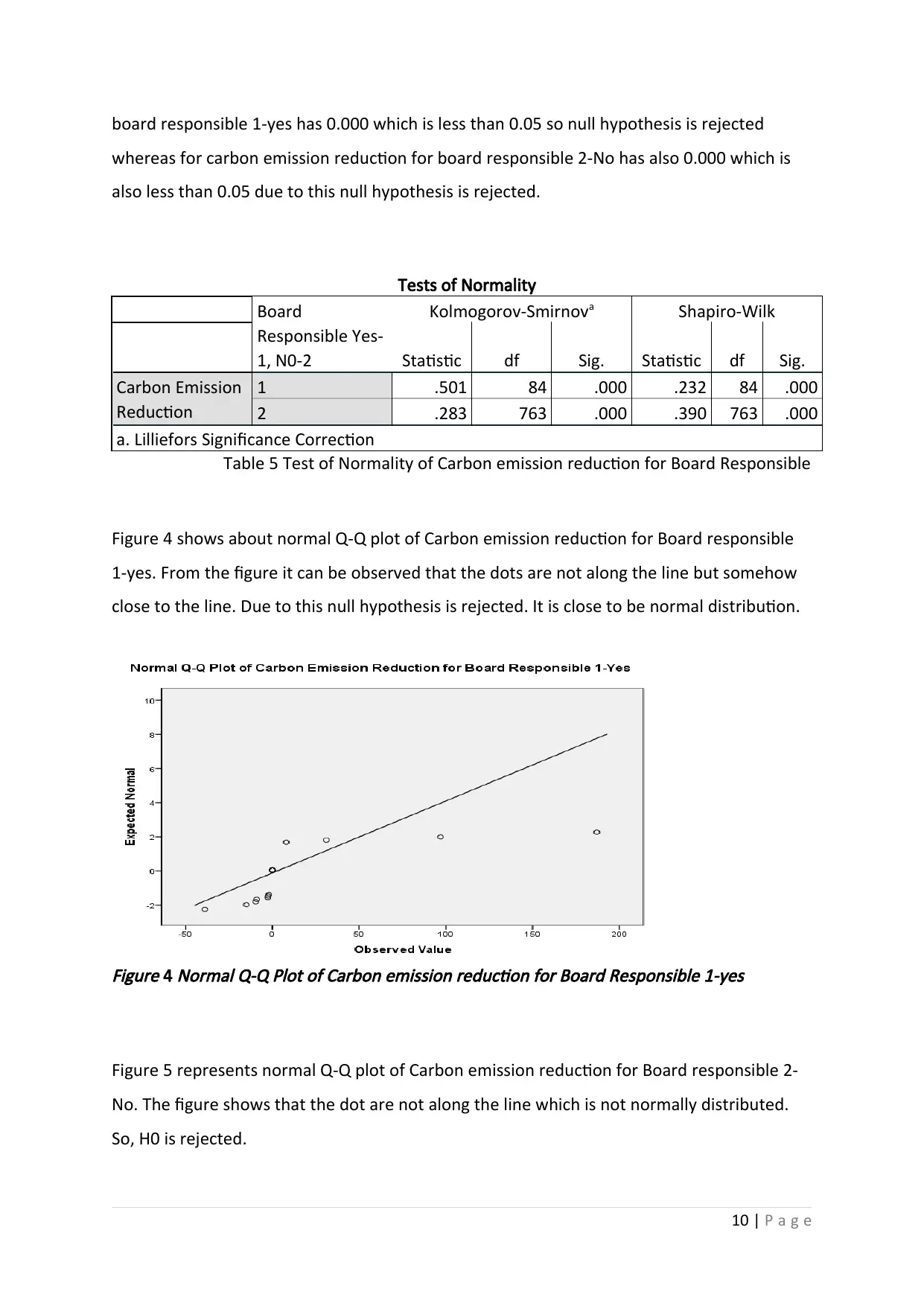
board responsible 1-yes has 0.000 which is less than 0.05 so null hypothesis is rejected
whereas for carbon emission reduction for board responsible 2-No has also 0.000 which is
also less than 0.05 due to this null hypothesis is rejected.
Tests of Normality
Board
Responsible Yes-
1, N0-2
Kolmogorov-Smirnova Shapiro-Wilk
Statistic df Sig. Statistic df Sig.
Carbon Emission
Reduction
1 .501 84 .000 .232 84 .000
2 .283 763 .000 .390 763 .000
a. Lilliefors Significance Correction
Table 5 Test of Normality of Carbon emission reduction for Board Responsible
Figure 4 shows about normal Q-Q plot of Carbon emission reduction for Board responsible
1-yes. From the figure it can be observed that the dots are not along the line but somehow
close to the line. Due to this null hypothesis is rejected. It is close to be normal distribution.
Figure 4
Normal Q-Q Plot of Carbon emission reduction for Board Responsible 1-yes
Figure 5 represents normal Q-Q plot of Carbon emission reduction for Board responsible 2-
No. The figure shows that the dot are not along the line which is not normally distributed.
So, H0 is rejected.
10 | P a g e
whereas for carbon emission reduction for board responsible 2-No has also 0.000 which is
also less than 0.05 due to this null hypothesis is rejected.
Tests of Normality
Board
Responsible Yes-
1, N0-2
Kolmogorov-Smirnova Shapiro-Wilk
Statistic df Sig. Statistic df Sig.
Carbon Emission
Reduction
1 .501 84 .000 .232 84 .000
2 .283 763 .000 .390 763 .000
a. Lilliefors Significance Correction
Table 5 Test of Normality of Carbon emission reduction for Board Responsible
Figure 4 shows about normal Q-Q plot of Carbon emission reduction for Board responsible
1-yes. From the figure it can be observed that the dots are not along the line but somehow
close to the line. Due to this null hypothesis is rejected. It is close to be normal distribution.
Figure 4
Normal Q-Q Plot of Carbon emission reduction for Board Responsible 1-yes
Figure 5 represents normal Q-Q plot of Carbon emission reduction for Board responsible 2-
No. The figure shows that the dot are not along the line which is not normally distributed.
So, H0 is rejected.
10 | P a g e
Secure Best Marks with AI Grader
Need help grading? Try our AI Grader for instant feedback on your assignments.
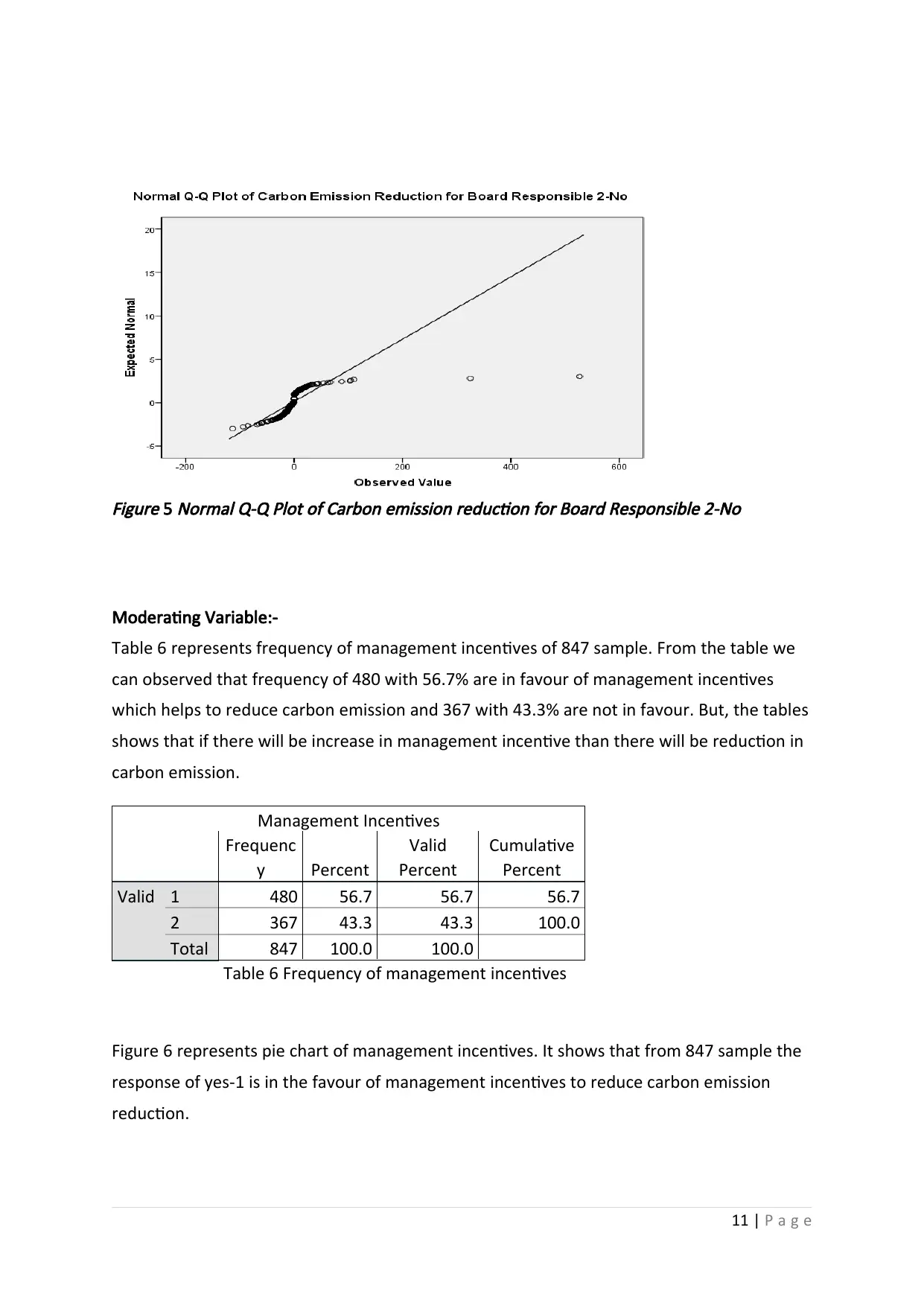
Figure 5
Normal Q-Q Plot of Carbon emission reduction for Board Responsible 2-No
Moderating Variable:-
Table 6 represents frequency of management incentives of 847 sample. From the table we
can observed that frequency of 480 with 56.7% are in favour of management incentives
which helps to reduce carbon emission and 367 with 43.3% are not in favour. But, the tables
shows that if there will be increase in management incentive than there will be reduction in
carbon emission.
Management Incentives
Frequenc
y Percent
Valid
Percent
Cumulative
Percent
Valid 1 480 56.7 56.7 56.7
2 367 43.3 43.3 100.0
Total 847 100.0 100.0
Table 6 Frequency of management incentives
Figure 6 represents pie chart of management incentives. It shows that from 847 sample the
response of yes-1 is in the favour of management incentives to reduce carbon emission
reduction.
11 | P a g e
Normal Q-Q Plot of Carbon emission reduction for Board Responsible 2-No
Moderating Variable:-
Table 6 represents frequency of management incentives of 847 sample. From the table we
can observed that frequency of 480 with 56.7% are in favour of management incentives
which helps to reduce carbon emission and 367 with 43.3% are not in favour. But, the tables
shows that if there will be increase in management incentive than there will be reduction in
carbon emission.
Management Incentives
Frequenc
y Percent
Valid
Percent
Cumulative
Percent
Valid 1 480 56.7 56.7 56.7
2 367 43.3 43.3 100.0
Total 847 100.0 100.0
Table 6 Frequency of management incentives
Figure 6 represents pie chart of management incentives. It shows that from 847 sample the
response of yes-1 is in the favour of management incentives to reduce carbon emission
reduction.
11 | P a g e
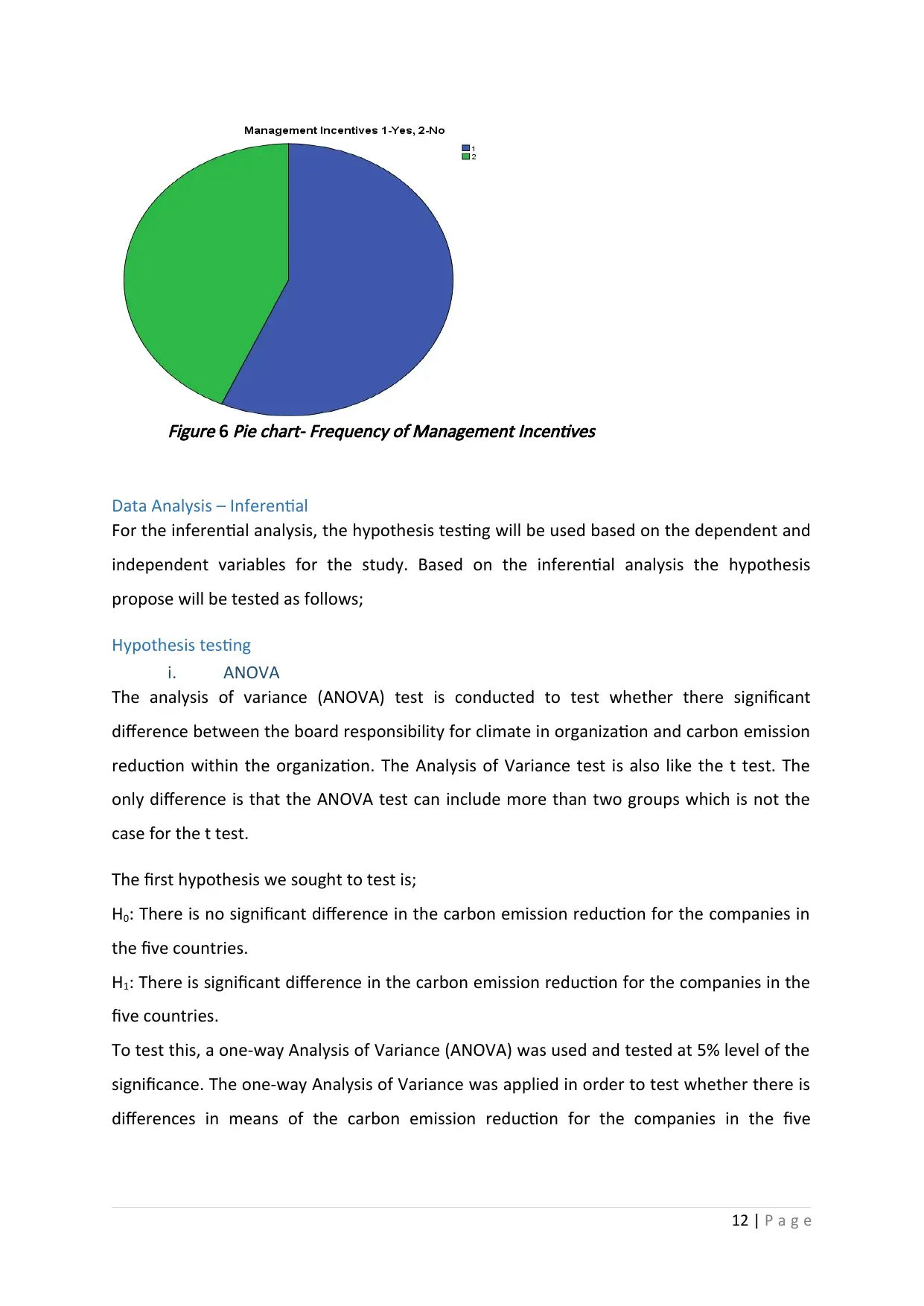
Figure 6
Pie chart- Frequency of Management Incentives
Data Analysis – Inferential
For the inferential analysis, the hypothesis testing will be used based on the dependent and
independent variables for the study. Based on the inferential analysis the hypothesis
propose will be tested as follows;
Hypothesis testing
i. ANOVA
The analysis of variance (ANOVA) test is conducted to test whether there significant
difference between the board responsibility for climate in organization and carbon emission
reduction within the organization. The Analysis of Variance test is also like the t test. The
only difference is that the ANOVA test can include more than two groups which is not the
case for the t test.
The first hypothesis we sought to test is;
H0: There is no significant difference in the carbon emission reduction for the companies in
the five countries.
H1: There is significant difference in the carbon emission reduction for the companies in the
five countries.
To test this, a one-way Analysis of Variance (ANOVA) was used and tested at 5% level of the
significance. The one-way Analysis of Variance was applied in order to test whether there is
differences in means of the carbon emission reduction for the companies in the five
12 | P a g e
Pie chart- Frequency of Management Incentives
Data Analysis – Inferential
For the inferential analysis, the hypothesis testing will be used based on the dependent and
independent variables for the study. Based on the inferential analysis the hypothesis
propose will be tested as follows;
Hypothesis testing
i. ANOVA
The analysis of variance (ANOVA) test is conducted to test whether there significant
difference between the board responsibility for climate in organization and carbon emission
reduction within the organization. The Analysis of Variance test is also like the t test. The
only difference is that the ANOVA test can include more than two groups which is not the
case for the t test.
The first hypothesis we sought to test is;
H0: There is no significant difference in the carbon emission reduction for the companies in
the five countries.
H1: There is significant difference in the carbon emission reduction for the companies in the
five countries.
To test this, a one-way Analysis of Variance (ANOVA) was used and tested at 5% level of the
significance. The one-way Analysis of Variance was applied in order to test whether there is
differences in means of the carbon emission reduction for the companies in the five
12 | P a g e
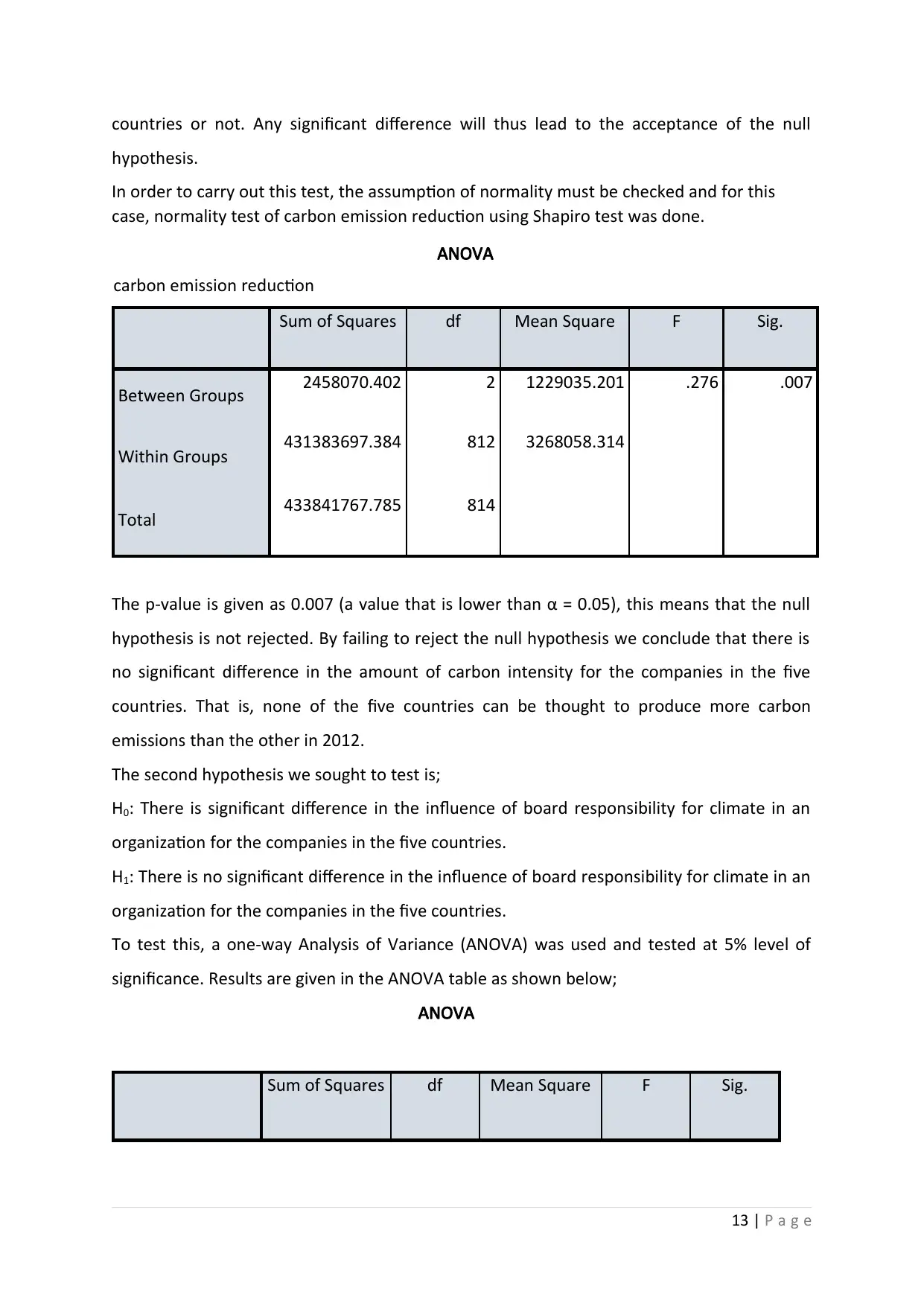
countries or not. Any significant difference will thus lead to the acceptance of the null
hypothesis.
In order to carry out this test, the assumption of normality must be checked and for this
case, normality test of carbon emission reduction using Shapiro test was done.
ANOVA
carbon emission reduction
Sum of Squares df Mean Square F Sig.
Between Groups 2458070.402 2 1229035.201 .276 .007
Within Groups 431383697.384 812 3268058.314
Total 433841767.785 814
The p-value is given as 0.007 (a value that is lower than α = 0.05), this means that the null
hypothesis is not rejected. By failing to reject the null hypothesis we conclude that there is
no significant difference in the amount of carbon intensity for the companies in the five
countries. That is, none of the five countries can be thought to produce more carbon
emissions than the other in 2012.
The second hypothesis we sought to test is;
H0: There is significant difference in the influence of board responsibility for climate in an
organization for the companies in the five countries.
H1: There is no significant difference in the influence of board responsibility for climate in an
organization for the companies in the five countries.
To test this, a one-way Analysis of Variance (ANOVA) was used and tested at 5% level of
significance. Results are given in the ANOVA table as shown below;
ANOVA
Sum of Squares df Mean Square F Sig.
13 | P a g e
hypothesis.
In order to carry out this test, the assumption of normality must be checked and for this
case, normality test of carbon emission reduction using Shapiro test was done.
ANOVA
carbon emission reduction
Sum of Squares df Mean Square F Sig.
Between Groups 2458070.402 2 1229035.201 .276 .007
Within Groups 431383697.384 812 3268058.314
Total 433841767.785 814
The p-value is given as 0.007 (a value that is lower than α = 0.05), this means that the null
hypothesis is not rejected. By failing to reject the null hypothesis we conclude that there is
no significant difference in the amount of carbon intensity for the companies in the five
countries. That is, none of the five countries can be thought to produce more carbon
emissions than the other in 2012.
The second hypothesis we sought to test is;
H0: There is significant difference in the influence of board responsibility for climate in an
organization for the companies in the five countries.
H1: There is no significant difference in the influence of board responsibility for climate in an
organization for the companies in the five countries.
To test this, a one-way Analysis of Variance (ANOVA) was used and tested at 5% level of
significance. Results are given in the ANOVA table as shown below;
ANOVA
Sum of Squares df Mean Square F Sig.
13 | P a g e
Paraphrase This Document
Need a fresh take? Get an instant paraphrase of this document with our AI Paraphraser
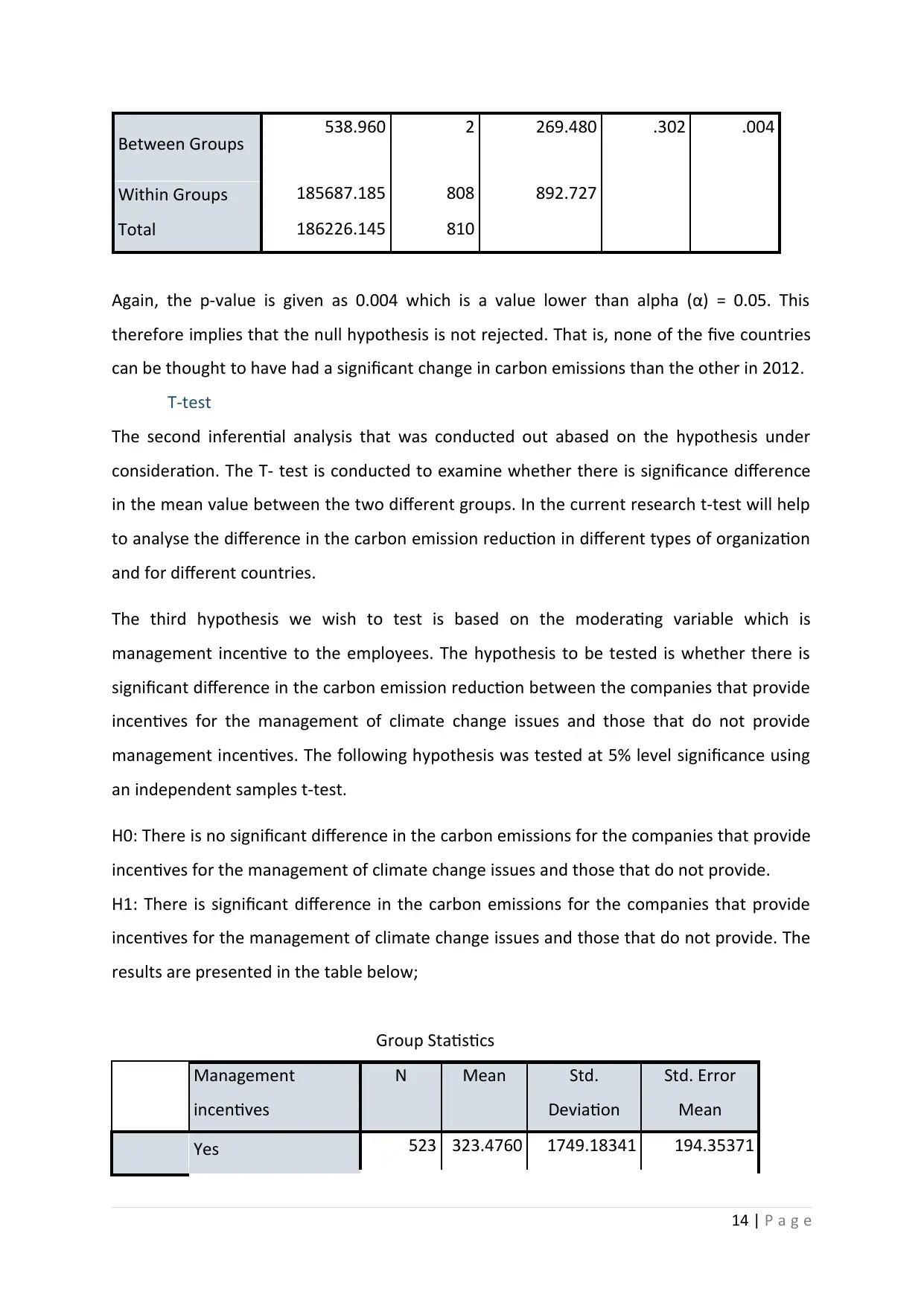
Between Groups 538.960 2 269.480 .302 .004
Within Groups 185687.185 808 892.727
Total 186226.145 810
Again, the p-value is given as 0.004 which is a value lower than alpha (α) = 0.05. This
therefore implies that the null hypothesis is not rejected. That is, none of the five countries
can be thought to have had a significant change in carbon emissions than the other in 2012.
T-test
The second inferential analysis that was conducted out abased on the hypothesis under
consideration. The T- test is conducted to examine whether there is significance difference
in the mean value between the two different groups. In the current research t-test will help
to analyse the difference in the carbon emission reduction in different types of organization
and for different countries.
The third hypothesis we wish to test is based on the moderating variable which is
management incentive to the employees. The hypothesis to be tested is whether there is
significant difference in the carbon emission reduction between the companies that provide
incentives for the management of climate change issues and those that do not provide
management incentives. The following hypothesis was tested at 5% level significance using
an independent samples t-test.
H0: There is no significant difference in the carbon emissions for the companies that provide
incentives for the management of climate change issues and those that do not provide.
H1: There is significant difference in the carbon emissions for the companies that provide
incentives for the management of climate change issues and those that do not provide. The
results are presented in the table below;
Group Statistics
Management
incentives
N Mean Std.
Deviation
Std. Error
Mean
Yes 523 323.4760 1749.18341 194.35371
14 | P a g e
Within Groups 185687.185 808 892.727
Total 186226.145 810
Again, the p-value is given as 0.004 which is a value lower than alpha (α) = 0.05. This
therefore implies that the null hypothesis is not rejected. That is, none of the five countries
can be thought to have had a significant change in carbon emissions than the other in 2012.
T-test
The second inferential analysis that was conducted out abased on the hypothesis under
consideration. The T- test is conducted to examine whether there is significance difference
in the mean value between the two different groups. In the current research t-test will help
to analyse the difference in the carbon emission reduction in different types of organization
and for different countries.
The third hypothesis we wish to test is based on the moderating variable which is
management incentive to the employees. The hypothesis to be tested is whether there is
significant difference in the carbon emission reduction between the companies that provide
incentives for the management of climate change issues and those that do not provide
management incentives. The following hypothesis was tested at 5% level significance using
an independent samples t-test.
H0: There is no significant difference in the carbon emissions for the companies that provide
incentives for the management of climate change issues and those that do not provide.
H1: There is significant difference in the carbon emissions for the companies that provide
incentives for the management of climate change issues and those that do not provide. The
results are presented in the table below;
Group Statistics
Management
incentives
N Mean Std.
Deviation
Std. Error
Mean
Yes 523 323.4760 1749.18341 194.35371
14 | P a g e
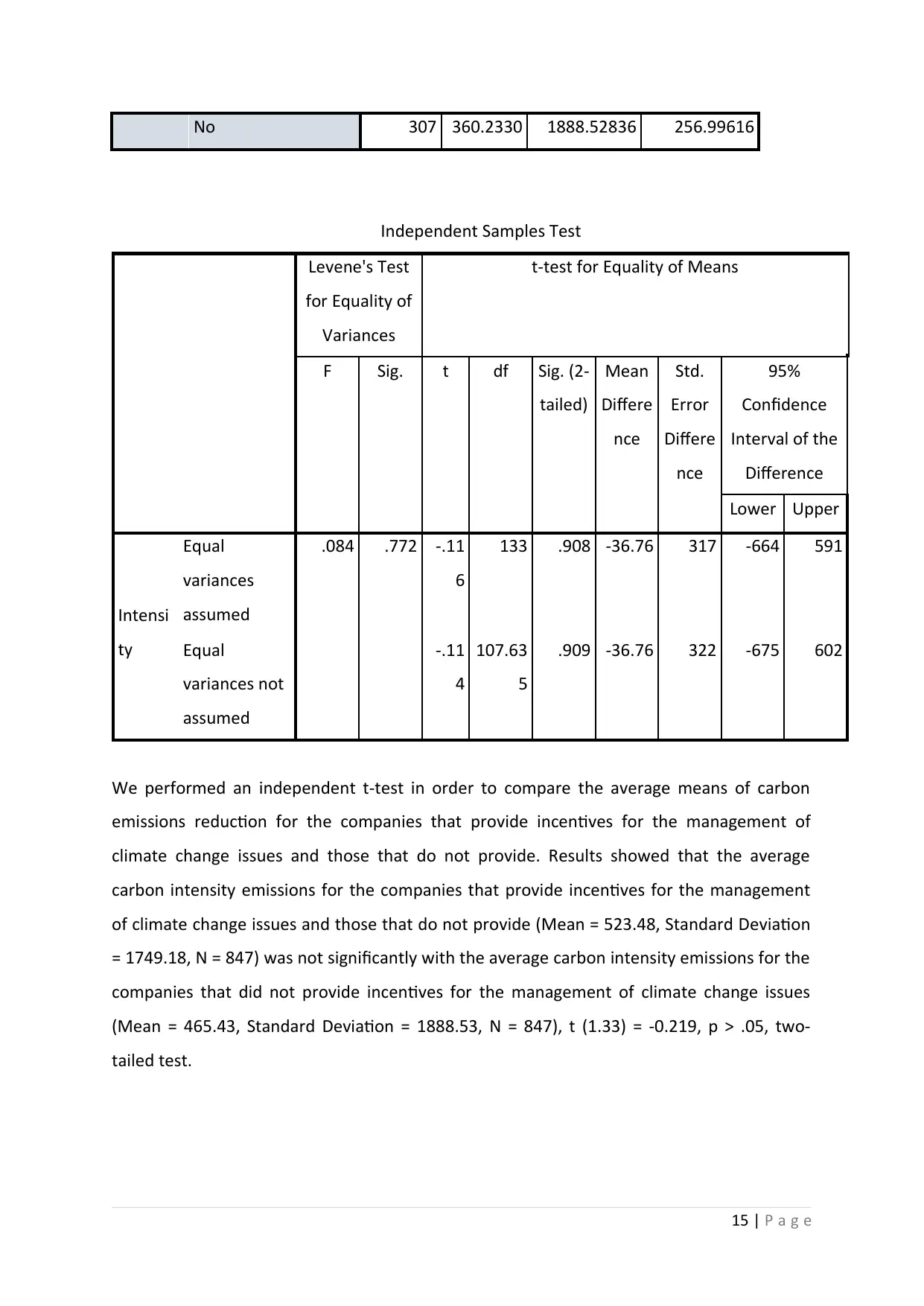
No 307 360.2330 1888.52836 256.99616
Independent Samples Test
Levene's Test
for Equality of
Variances
t-test for Equality of Means
F Sig. t df Sig. (2-
tailed)
Mean
Differe
nce
Std.
Error
Differe
nce
95%
Confidence
Interval of the
Difference
Lower Upper
Intensi
ty
Equal
variances
assumed
.084 .772 -.11
6
133 .908 -36.76 317 -664 591
Equal
variances not
assumed
-.11
4
107.63
5
.909 -36.76 322 -675 602
We performed an independent t-test in order to compare the average means of carbon
emissions reduction for the companies that provide incentives for the management of
climate change issues and those that do not provide. Results showed that the average
carbon intensity emissions for the companies that provide incentives for the management
of climate change issues and those that do not provide (Mean = 523.48, Standard Deviation
= 1749.18, N = 847) was not significantly with the average carbon intensity emissions for the
companies that did not provide incentives for the management of climate change issues
(Mean = 465.43, Standard Deviation = 1888.53, N = 847), t (1.33) = -0.219, p > .05, two-
tailed test.
15 | P a g e
Independent Samples Test
Levene's Test
for Equality of
Variances
t-test for Equality of Means
F Sig. t df Sig. (2-
tailed)
Mean
Differe
nce
Std.
Error
Differe
nce
95%
Confidence
Interval of the
Difference
Lower Upper
Intensi
ty
Equal
variances
assumed
.084 .772 -.11
6
133 .908 -36.76 317 -664 591
Equal
variances not
assumed
-.11
4
107.63
5
.909 -36.76 322 -675 602
We performed an independent t-test in order to compare the average means of carbon
emissions reduction for the companies that provide incentives for the management of
climate change issues and those that do not provide. Results showed that the average
carbon intensity emissions for the companies that provide incentives for the management
of climate change issues and those that do not provide (Mean = 523.48, Standard Deviation
= 1749.18, N = 847) was not significantly with the average carbon intensity emissions for the
companies that did not provide incentives for the management of climate change issues
(Mean = 465.43, Standard Deviation = 1888.53, N = 847), t (1.33) = -0.219, p > .05, two-
tailed test.
15 | P a g e
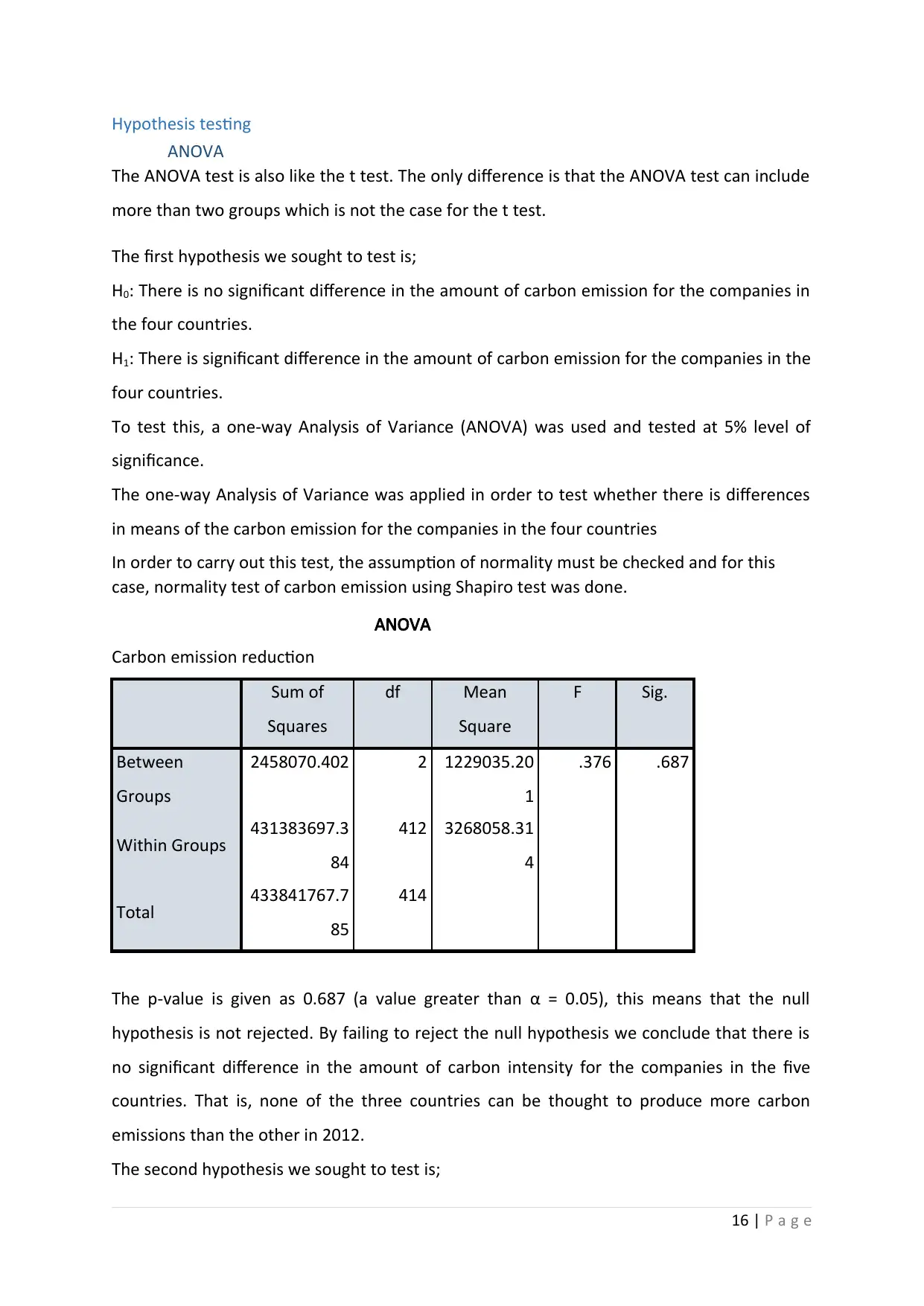
Hypothesis testing
ANOVA
The ANOVA test is also like the t test. The only difference is that the ANOVA test can include
more than two groups which is not the case for the t test.
The first hypothesis we sought to test is;
H0: There is no significant difference in the amount of carbon emission for the companies in
the four countries.
H1: There is significant difference in the amount of carbon emission for the companies in the
four countries.
To test this, a one-way Analysis of Variance (ANOVA) was used and tested at 5% level of
significance.
The one-way Analysis of Variance was applied in order to test whether there is differences
in means of the carbon emission for the companies in the four countries
In order to carry out this test, the assumption of normality must be checked and for this
case, normality test of carbon emission using Shapiro test was done.
ANOVA
Carbon emission reduction
Sum of
Squares
df Mean
Square
F Sig.
Between
Groups
2458070.402 2 1229035.20
1
.376 .687
Within Groups 431383697.3
84
412 3268058.31
4
Total 433841767.7
85
414
The p-value is given as 0.687 (a value greater than α = 0.05), this means that the null
hypothesis is not rejected. By failing to reject the null hypothesis we conclude that there is
no significant difference in the amount of carbon intensity for the companies in the five
countries. That is, none of the three countries can be thought to produce more carbon
emissions than the other in 2012.
The second hypothesis we sought to test is;
16 | P a g e
ANOVA
The ANOVA test is also like the t test. The only difference is that the ANOVA test can include
more than two groups which is not the case for the t test.
The first hypothesis we sought to test is;
H0: There is no significant difference in the amount of carbon emission for the companies in
the four countries.
H1: There is significant difference in the amount of carbon emission for the companies in the
four countries.
To test this, a one-way Analysis of Variance (ANOVA) was used and tested at 5% level of
significance.
The one-way Analysis of Variance was applied in order to test whether there is differences
in means of the carbon emission for the companies in the four countries
In order to carry out this test, the assumption of normality must be checked and for this
case, normality test of carbon emission using Shapiro test was done.
ANOVA
Carbon emission reduction
Sum of
Squares
df Mean
Square
F Sig.
Between
Groups
2458070.402 2 1229035.20
1
.376 .687
Within Groups 431383697.3
84
412 3268058.31
4
Total 433841767.7
85
414
The p-value is given as 0.687 (a value greater than α = 0.05), this means that the null
hypothesis is not rejected. By failing to reject the null hypothesis we conclude that there is
no significant difference in the amount of carbon intensity for the companies in the five
countries. That is, none of the three countries can be thought to produce more carbon
emissions than the other in 2012.
The second hypothesis we sought to test is;
16 | P a g e
Secure Best Marks with AI Grader
Need help grading? Try our AI Grader for instant feedback on your assignments.
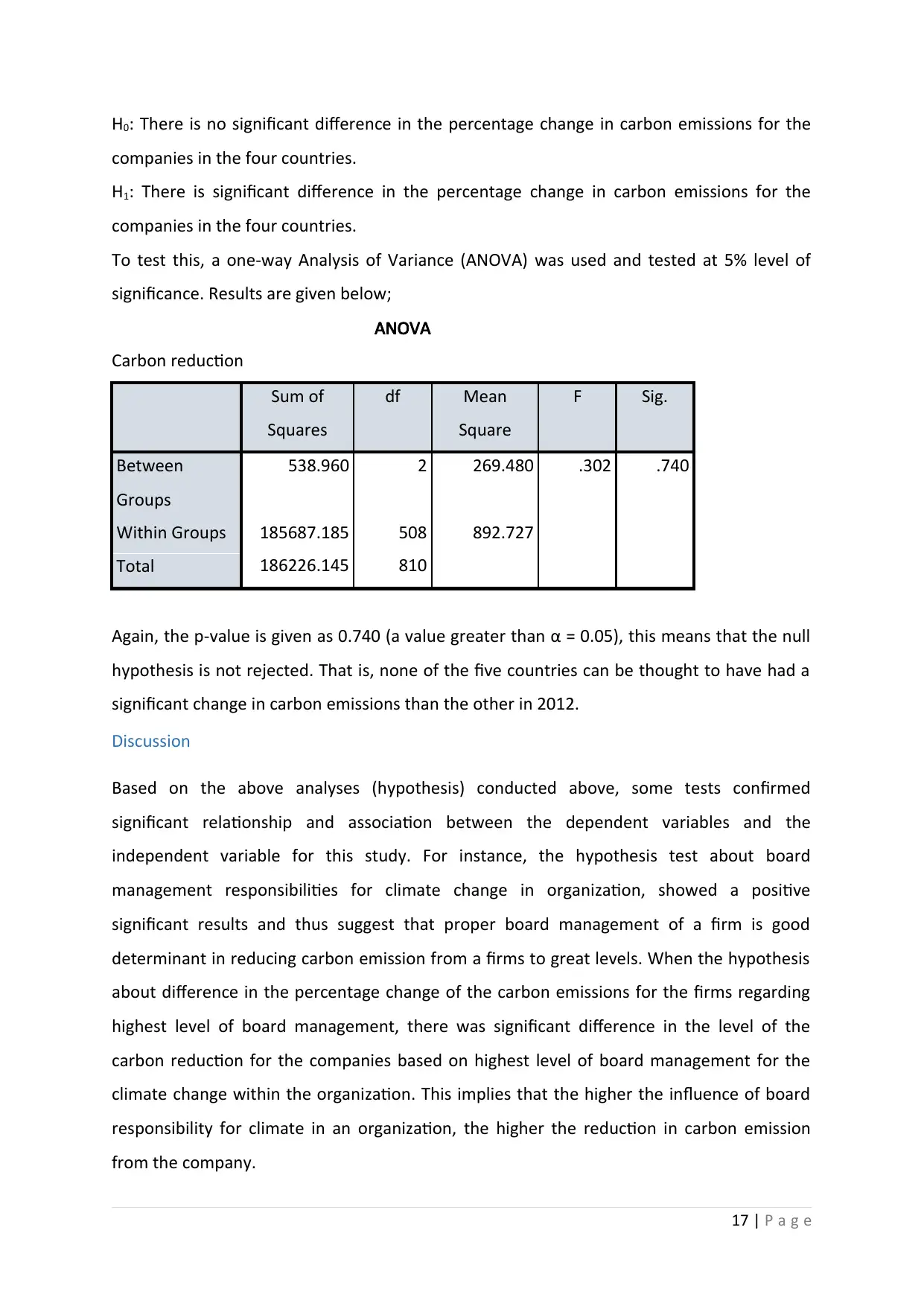
H0: There is no significant difference in the percentage change in carbon emissions for the
companies in the four countries.
H1: There is significant difference in the percentage change in carbon emissions for the
companies in the four countries.
To test this, a one-way Analysis of Variance (ANOVA) was used and tested at 5% level of
significance. Results are given below;
ANOVA
Carbon reduction
Sum of
Squares
df Mean
Square
F Sig.
Between
Groups
538.960 2 269.480 .302 .740
Within Groups 185687.185 508 892.727
Total 186226.145 810
Again, the p-value is given as 0.740 (a value greater than α = 0.05), this means that the null
hypothesis is not rejected. That is, none of the five countries can be thought to have had a
significant change in carbon emissions than the other in 2012.
Discussion
Based on the above analyses (hypothesis) conducted above, some tests confirmed
significant relationship and association between the dependent variables and the
independent variable for this study. For instance, the hypothesis test about board
management responsibilities for climate change in organization, showed a positive
significant results and thus suggest that proper board management of a firm is good
determinant in reducing carbon emission from a firms to great levels. When the hypothesis
about difference in the percentage change of the carbon emissions for the firms regarding
highest level of board management, there was significant difference in the level of the
carbon reduction for the companies based on highest level of board management for the
climate change within the organization. This implies that the higher the influence of board
responsibility for climate in an organization, the higher the reduction in carbon emission
from the company.
17 | P a g e
companies in the four countries.
H1: There is significant difference in the percentage change in carbon emissions for the
companies in the four countries.
To test this, a one-way Analysis of Variance (ANOVA) was used and tested at 5% level of
significance. Results are given below;
ANOVA
Carbon reduction
Sum of
Squares
df Mean
Square
F Sig.
Between
Groups
538.960 2 269.480 .302 .740
Within Groups 185687.185 508 892.727
Total 186226.145 810
Again, the p-value is given as 0.740 (a value greater than α = 0.05), this means that the null
hypothesis is not rejected. That is, none of the five countries can be thought to have had a
significant change in carbon emissions than the other in 2012.
Discussion
Based on the above analyses (hypothesis) conducted above, some tests confirmed
significant relationship and association between the dependent variables and the
independent variable for this study. For instance, the hypothesis test about board
management responsibilities for climate change in organization, showed a positive
significant results and thus suggest that proper board management of a firm is good
determinant in reducing carbon emission from a firms to great levels. When the hypothesis
about difference in the percentage change of the carbon emissions for the firms regarding
highest level of board management, there was significant difference in the level of the
carbon reduction for the companies based on highest level of board management for the
climate change within the organization. This implies that the higher the influence of board
responsibility for climate in an organization, the higher the reduction in carbon emission
from the company.
17 | P a g e
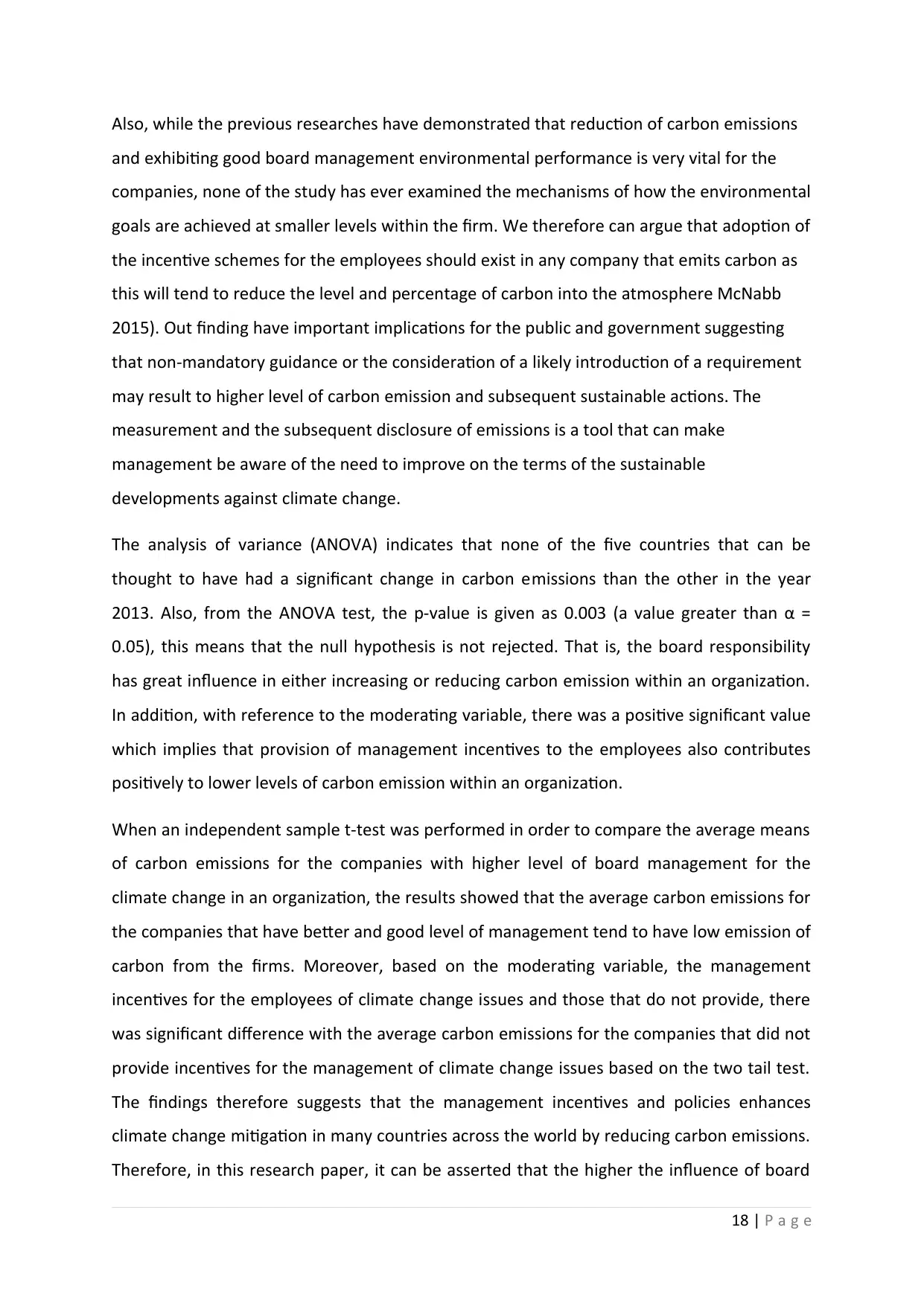
Also, while the previous researches have demonstrated that reduction of carbon emissions
and exhibiting good board management environmental performance is very vital for the
companies, none of the study has ever examined the mechanisms of how the environmental
goals are achieved at smaller levels within the firm. We therefore can argue that adoption of
the incentive schemes for the employees should exist in any company that emits carbon as
this will tend to reduce the level and percentage of carbon into the atmosphere McNabb
2015). Out finding have important implications for the public and government suggesting
that non-mandatory guidance or the consideration of a likely introduction of a requirement
may result to higher level of carbon emission and subsequent sustainable actions. The
measurement and the subsequent disclosure of emissions is a tool that can make
management be aware of the need to improve on the terms of the sustainable
developments against climate change.
The analysis of variance (ANOVA) indicates that none of the five countries that can be
thought to have had a significant change in carbon emissions than the other in the year
2013. Also, from the ANOVA test, the p-value is given as 0.003 (a value greater than α =
0.05), this means that the null hypothesis is not rejected. That is, the board responsibility
has great influence in either increasing or reducing carbon emission within an organization.
In addition, with reference to the moderating variable, there was a positive significant value
which implies that provision of management incentives to the employees also contributes
positively to lower levels of carbon emission within an organization.
When an independent sample t-test was performed in order to compare the average means
of carbon emissions for the companies with higher level of board management for the
climate change in an organization, the results showed that the average carbon emissions for
the companies that have better and good level of management tend to have low emission of
carbon from the firms. Moreover, based on the moderating variable, the management
incentives for the employees of climate change issues and those that do not provide, there
was significant difference with the average carbon emissions for the companies that did not
provide incentives for the management of climate change issues based on the two tail test.
The findings therefore suggests that the management incentives and policies enhances
climate change mitigation in many countries across the world by reducing carbon emissions.
Therefore, in this research paper, it can be asserted that the higher the influence of board
18 | P a g e
and exhibiting good board management environmental performance is very vital for the
companies, none of the study has ever examined the mechanisms of how the environmental
goals are achieved at smaller levels within the firm. We therefore can argue that adoption of
the incentive schemes for the employees should exist in any company that emits carbon as
this will tend to reduce the level and percentage of carbon into the atmosphere McNabb
2015). Out finding have important implications for the public and government suggesting
that non-mandatory guidance or the consideration of a likely introduction of a requirement
may result to higher level of carbon emission and subsequent sustainable actions. The
measurement and the subsequent disclosure of emissions is a tool that can make
management be aware of the need to improve on the terms of the sustainable
developments against climate change.
The analysis of variance (ANOVA) indicates that none of the five countries that can be
thought to have had a significant change in carbon emissions than the other in the year
2013. Also, from the ANOVA test, the p-value is given as 0.003 (a value greater than α =
0.05), this means that the null hypothesis is not rejected. That is, the board responsibility
has great influence in either increasing or reducing carbon emission within an organization.
In addition, with reference to the moderating variable, there was a positive significant value
which implies that provision of management incentives to the employees also contributes
positively to lower levels of carbon emission within an organization.
When an independent sample t-test was performed in order to compare the average means
of carbon emissions for the companies with higher level of board management for the
climate change in an organization, the results showed that the average carbon emissions for
the companies that have better and good level of management tend to have low emission of
carbon from the firms. Moreover, based on the moderating variable, the management
incentives for the employees of climate change issues and those that do not provide, there
was significant difference with the average carbon emissions for the companies that did not
provide incentives for the management of climate change issues based on the two tail test.
The findings therefore suggests that the management incentives and policies enhances
climate change mitigation in many countries across the world by reducing carbon emissions.
Therefore, in this research paper, it can be asserted that the higher the influence of board
18 | P a g e
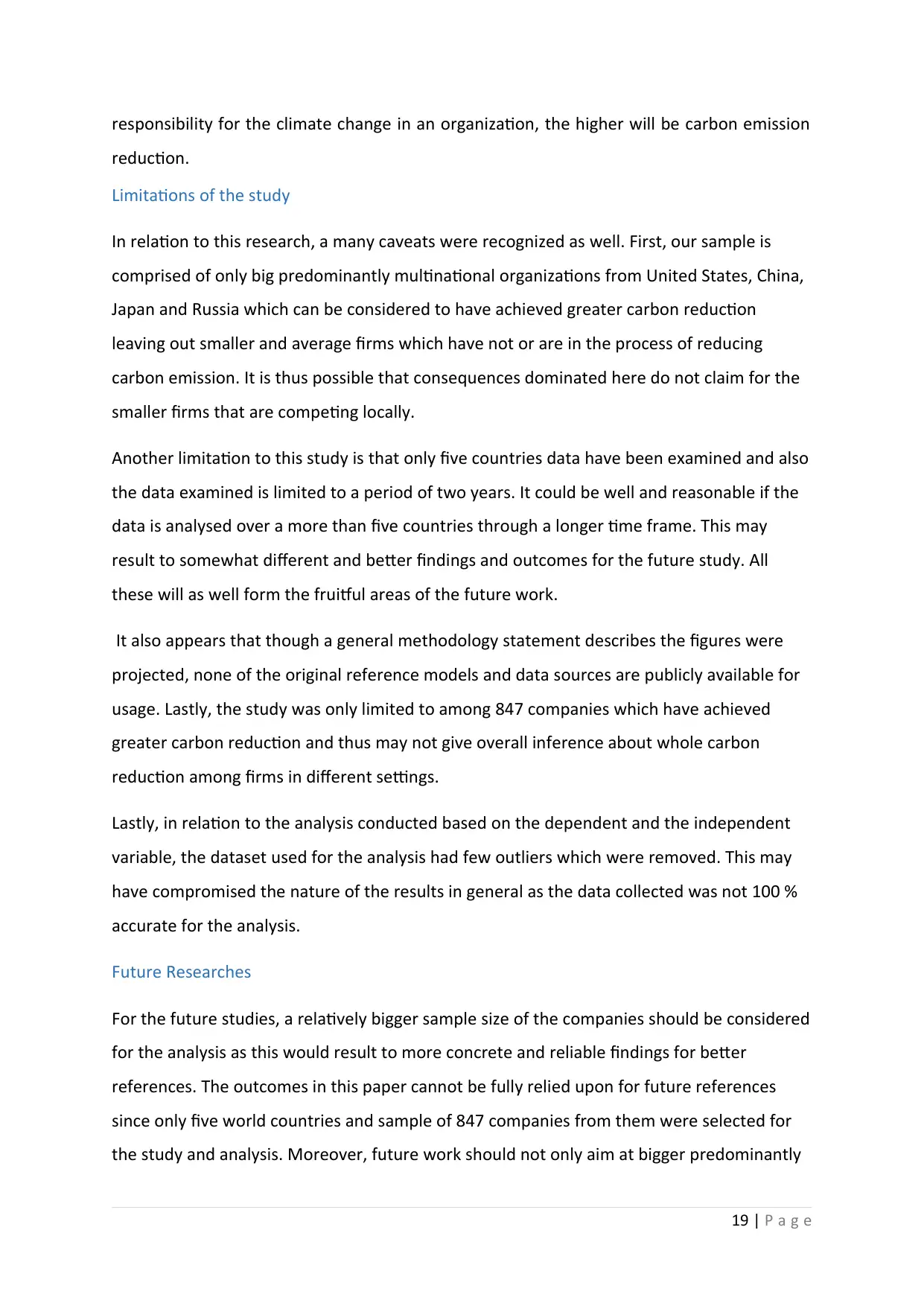
responsibility for the climate change in an organization, the higher will be carbon emission
reduction.
Limitations of the study
In relation to this research, a many caveats were recognized as well. First, our sample is
comprised of only big predominantly multinational organizations from United States, China,
Japan and Russia which can be considered to have achieved greater carbon reduction
leaving out smaller and average firms which have not or are in the process of reducing
carbon emission. It is thus possible that consequences dominated here do not claim for the
smaller firms that are competing locally.
Another limitation to this study is that only five countries data have been examined and also
the data examined is limited to a period of two years. It could be well and reasonable if the
data is analysed over a more than five countries through a longer time frame. This may
result to somewhat different and better findings and outcomes for the future study. All
these will as well form the fruitful areas of the future work.
It also appears that though a general methodology statement describes the figures were
projected, none of the original reference models and data sources are publicly available for
usage. Lastly, the study was only limited to among 847 companies which have achieved
greater carbon reduction and thus may not give overall inference about whole carbon
reduction among firms in different settings.
Lastly, in relation to the analysis conducted based on the dependent and the independent
variable, the dataset used for the analysis had few outliers which were removed. This may
have compromised the nature of the results in general as the data collected was not 100 %
accurate for the analysis.
Future Researches
For the future studies, a relatively bigger sample size of the companies should be considered
for the analysis as this would result to more concrete and reliable findings for better
references. The outcomes in this paper cannot be fully relied upon for future references
since only five world countries and sample of 847 companies from them were selected for
the study and analysis. Moreover, future work should not only aim at bigger predominantly
19 | P a g e
reduction.
Limitations of the study
In relation to this research, a many caveats were recognized as well. First, our sample is
comprised of only big predominantly multinational organizations from United States, China,
Japan and Russia which can be considered to have achieved greater carbon reduction
leaving out smaller and average firms which have not or are in the process of reducing
carbon emission. It is thus possible that consequences dominated here do not claim for the
smaller firms that are competing locally.
Another limitation to this study is that only five countries data have been examined and also
the data examined is limited to a period of two years. It could be well and reasonable if the
data is analysed over a more than five countries through a longer time frame. This may
result to somewhat different and better findings and outcomes for the future study. All
these will as well form the fruitful areas of the future work.
It also appears that though a general methodology statement describes the figures were
projected, none of the original reference models and data sources are publicly available for
usage. Lastly, the study was only limited to among 847 companies which have achieved
greater carbon reduction and thus may not give overall inference about whole carbon
reduction among firms in different settings.
Lastly, in relation to the analysis conducted based on the dependent and the independent
variable, the dataset used for the analysis had few outliers which were removed. This may
have compromised the nature of the results in general as the data collected was not 100 %
accurate for the analysis.
Future Researches
For the future studies, a relatively bigger sample size of the companies should be considered
for the analysis as this would result to more concrete and reliable findings for better
references. The outcomes in this paper cannot be fully relied upon for future references
since only five world countries and sample of 847 companies from them were selected for
the study and analysis. Moreover, future work should not only aim at bigger predominantly
19 | P a g e
Paraphrase This Document
Need a fresh take? Get an instant paraphrase of this document with our AI Paraphraser

multinomial organizations which have achieved or have well integrated board management
and business strategy in reducing carbon emission but also, focus on small organizations
which have no or little strategies on carbon reduction. This will compromise the nature of
the results and can lead to poor references about the existing variable and predictors hence
bad results.
References
20 | P a g e
and business strategy in reducing carbon emission but also, focus on small organizations
which have no or little strategies on carbon reduction. This will compromise the nature of
the results and can lead to poor references about the existing variable and predictors hence
bad results.
References
20 | P a g e
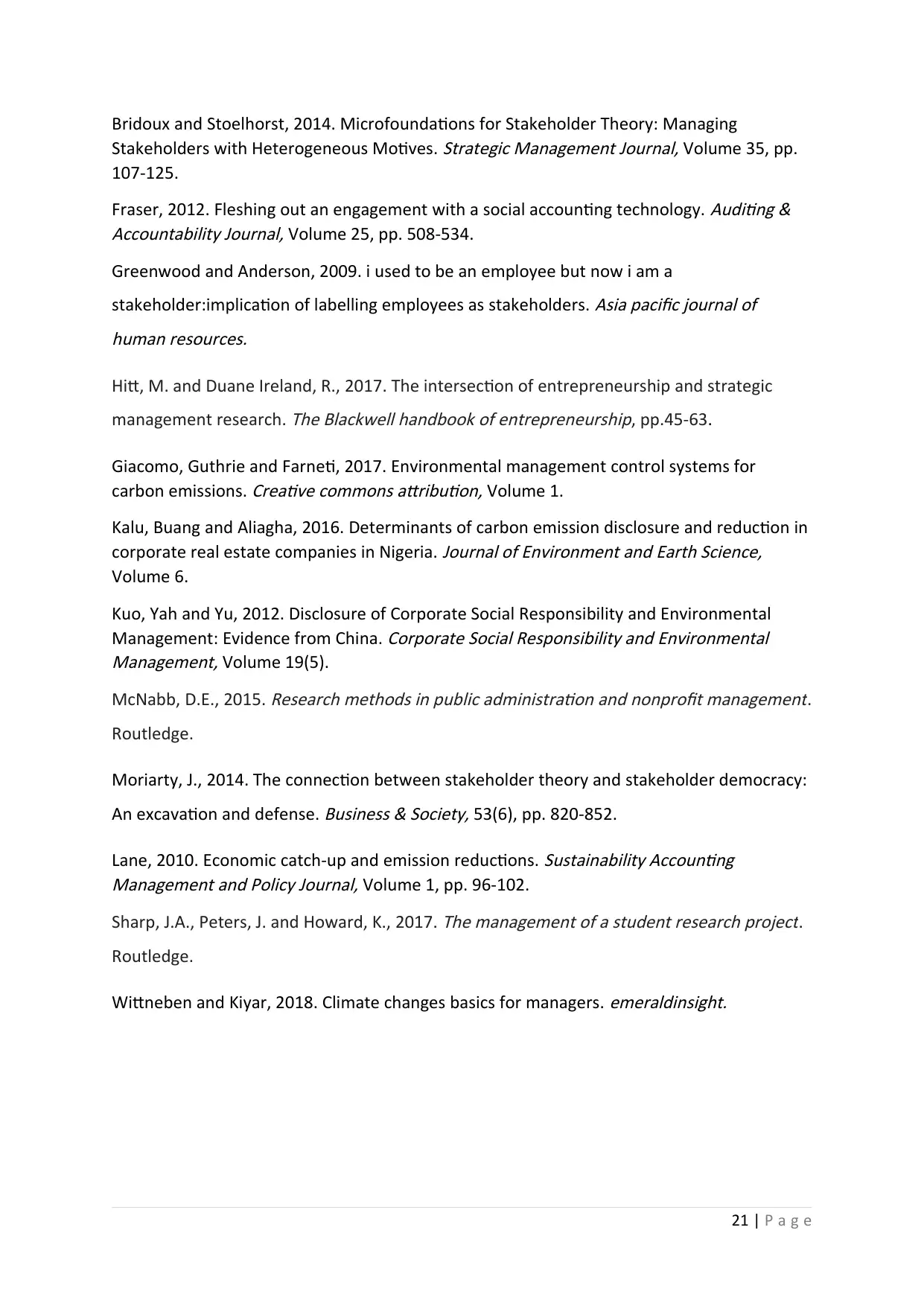
Bridoux and Stoelhorst, 2014. Microfoundations for Stakeholder Theory: Managing
Stakeholders with Heterogeneous Motives.
Strategic Management Journal, Volume 35, pp.
107-125.
Fraser, 2012. Fleshing out an engagement with a social accounting technology.
Auditing &
Accountability Journal, Volume 25, pp. 508-534.
Greenwood and Anderson, 2009. i used to be an employee but now i am a
stakeholder:implication of labelling employees as stakeholders.
Asia pacific journal of
human resources.
Hitt, M. and Duane Ireland, R., 2017. The intersection of entrepreneurship and strategic
management research.
The Blackwell handbook of entrepreneurship, pp.45-63.
Giacomo, Guthrie and Farneti, 2017. Environmental management control systems for
carbon emissions.
Creative commons attribution, Volume 1.
Kalu, Buang and Aliagha, 2016. Determinants of carbon emission disclosure and reduction in
corporate real estate companies in Nigeria.
Journal of Environment and Earth Science,
Volume 6.
Kuo, Yah and Yu, 2012. Disclosure of Corporate Social Responsibility and Environmental
Management: Evidence from China.
Corporate Social Responsibility and Environmental
Management, Volume 19(5).
McNabb, D.E., 2015.
Research methods in public administration and nonprofit management.
Routledge.
Moriarty, J., 2014. The connection between stakeholder theory and stakeholder democracy:
An excavation and defense.
Business & Society, 53(6), pp. 820-852.
Lane, 2010. Economic catch-up and emission reductions.
Sustainability Accounting
Management and Policy Journal, Volume 1, pp. 96-102.
Sharp, J.A., Peters, J. and Howard, K., 2017.
The management of a student research project.
Routledge.
Wittneben and Kiyar, 2018. Climate changes basics for managers.
emeraldinsight.
21 | P a g e
Stakeholders with Heterogeneous Motives.
Strategic Management Journal, Volume 35, pp.
107-125.
Fraser, 2012. Fleshing out an engagement with a social accounting technology.
Auditing &
Accountability Journal, Volume 25, pp. 508-534.
Greenwood and Anderson, 2009. i used to be an employee but now i am a
stakeholder:implication of labelling employees as stakeholders.
Asia pacific journal of
human resources.
Hitt, M. and Duane Ireland, R., 2017. The intersection of entrepreneurship and strategic
management research.
The Blackwell handbook of entrepreneurship, pp.45-63.
Giacomo, Guthrie and Farneti, 2017. Environmental management control systems for
carbon emissions.
Creative commons attribution, Volume 1.
Kalu, Buang and Aliagha, 2016. Determinants of carbon emission disclosure and reduction in
corporate real estate companies in Nigeria.
Journal of Environment and Earth Science,
Volume 6.
Kuo, Yah and Yu, 2012. Disclosure of Corporate Social Responsibility and Environmental
Management: Evidence from China.
Corporate Social Responsibility and Environmental
Management, Volume 19(5).
McNabb, D.E., 2015.
Research methods in public administration and nonprofit management.
Routledge.
Moriarty, J., 2014. The connection between stakeholder theory and stakeholder democracy:
An excavation and defense.
Business & Society, 53(6), pp. 820-852.
Lane, 2010. Economic catch-up and emission reductions.
Sustainability Accounting
Management and Policy Journal, Volume 1, pp. 96-102.
Sharp, J.A., Peters, J. and Howard, K., 2017.
The management of a student research project.
Routledge.
Wittneben and Kiyar, 2018. Climate changes basics for managers.
emeraldinsight.
21 | P a g e
1 out of 21
Related Documents
Your All-in-One AI-Powered Toolkit for Academic Success.
+13062052269
info@desklib.com
Available 24*7 on WhatsApp / Email
![[object Object]](/_next/static/media/star-bottom.7253800d.svg)
Unlock your academic potential
© 2024 | Zucol Services PVT LTD | All rights reserved.



